Part 11: The Old Man And The Boy
Act Two Chapter Three - The Dead Three (Or The Rise, Fall, And Rise Again of Bane, Myrkul And Bhaal)
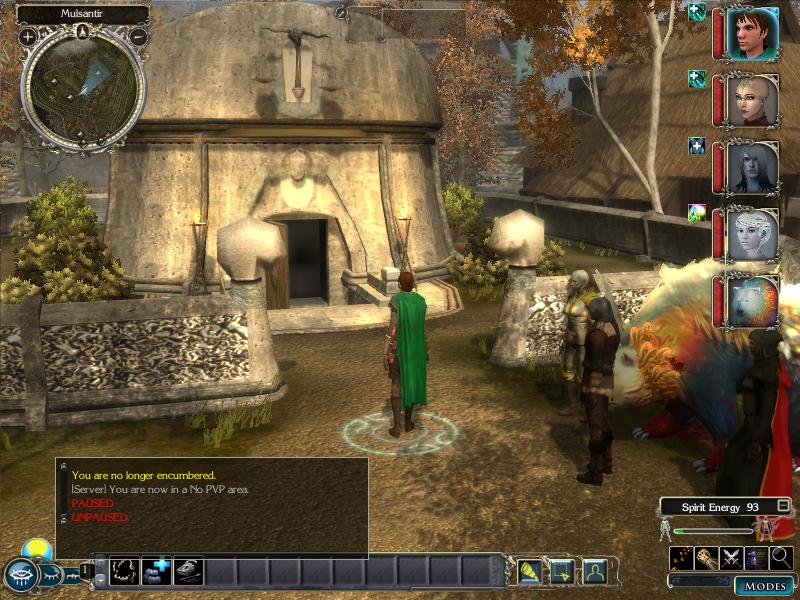
We originally got Kaelyn to join us in exchange for our help with getting past the locked gate in the Death God's Vault in Shadow Mulsantir. Now, we're not obligated to repay this debt in the slightest, but it's worth completing the Vault before you leave Mulsantir anyway.
First, though, we're going to do some research. We're going to speak with the priests of Kelemvor.
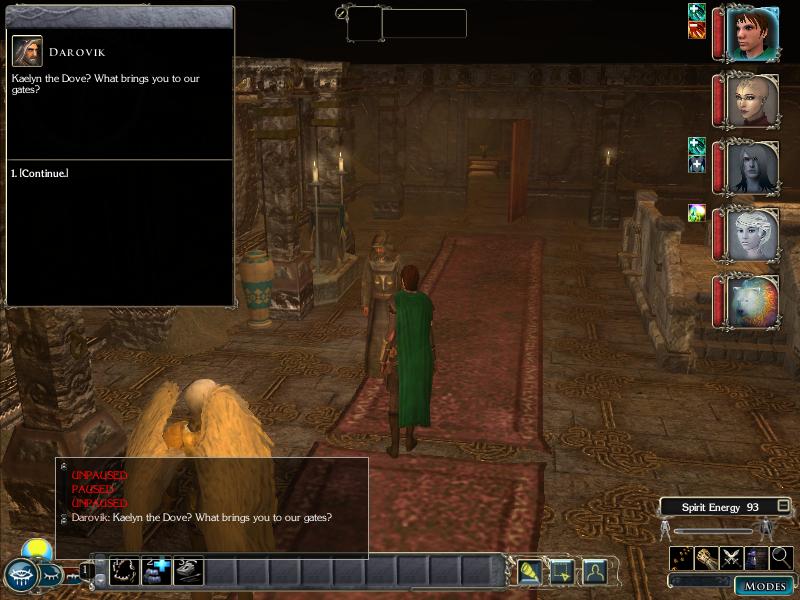
That is if they don't throw us out for bringing an apostate into the temple.
 : It was not my choice, priest of Kelemvor.
: It was not my choice, priest of Kelemvor. : I had thought as much. To come here, your need must be great.
: I had thought as much. To come here, your need must be great. : I need nothing from Kelemvor, which is for the best. I fear the consequences should your god act.
: I need nothing from Kelemvor, which is for the best. I fear the consequences should your god act. : Change is not as easy as it may seem to your eyes, Kaelyn. And to enact change through violence...
: Change is not as easy as it may seem to your eyes, Kaelyn. And to enact change through violence...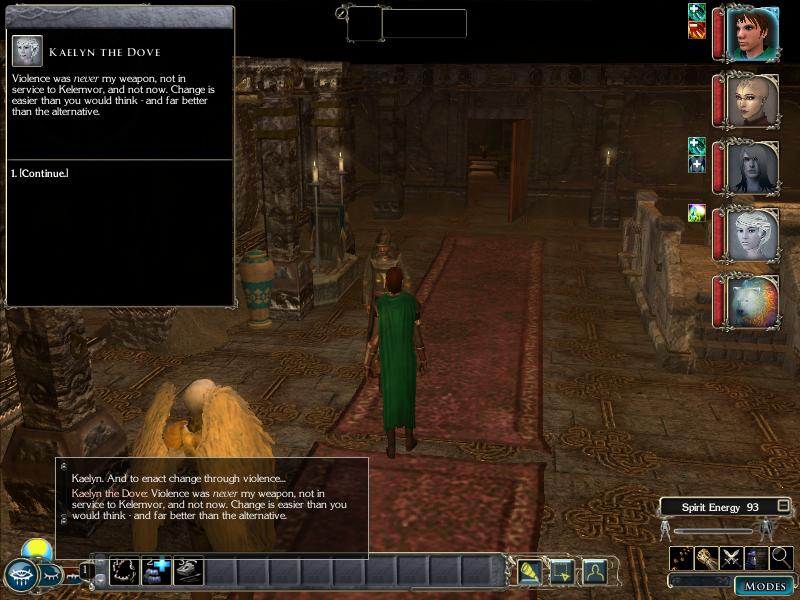
 : Kaelyn - please, listen. Where one ritual is cast down, another may arise, worse than the first. It is not our place to question Kelemvor in this. He is our-
: Kaelyn - please, listen. Where one ritual is cast down, another may arise, worse than the first. It is not our place to question Kelemvor in this. He is our- : Kelemvor is your god. Not mine.
: Kelemvor is your god. Not mine. : I dwell in the House of Ilmater now. I am no longer one of your doomguides, giving false hope to those who have led honest lives.
: I dwell in the House of Ilmater now. I am no longer one of your doomguides, giving false hope to those who have led honest lives.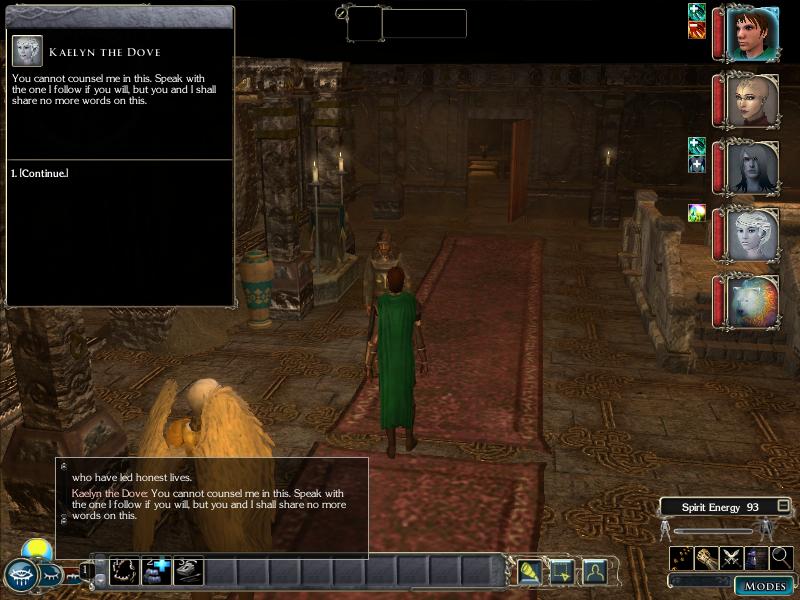
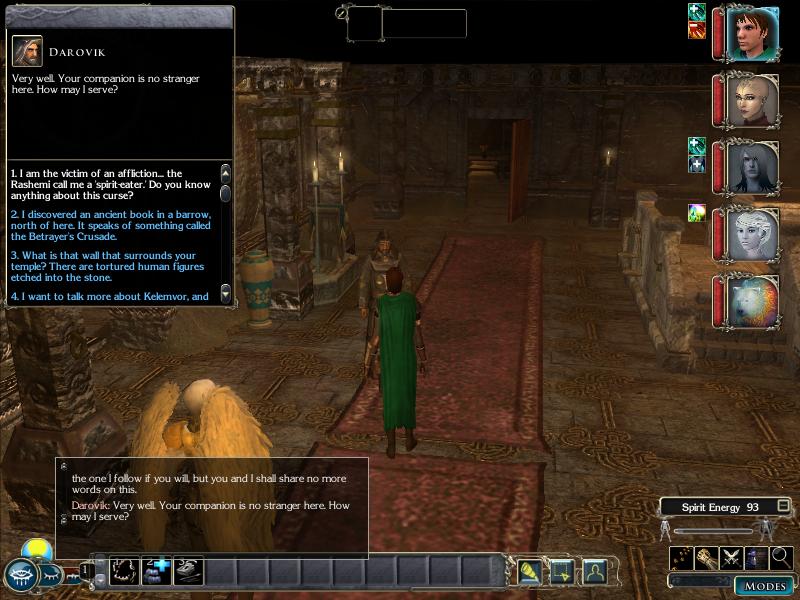
Typical Obsidian game. You try to get some answers and all you find are more questions.
We'll quiz Kaelyn later. For now:
 : That curse is known to me, but only as a tale. Such a hunger speaks to me of emptiness.
: That curse is known to me, but only as a tale. Such a hunger speaks to me of emptiness. : You have a void inside you, perhaps... a void that hungers to fill itself up, yet it cannot. It can only consume, for its essence is gone, and only hunger remains.
: You have a void inside you, perhaps... a void that hungers to fill itself up, yet it cannot. It can only consume, for its essence is gone, and only hunger remains. : But such an emptiness in a living soul... I cannot guess how it came to be.
: But such an emptiness in a living soul... I cannot guess how it came to be.But we know all this already.
 : What is that wall that surrounds your temple? There are tortured human figures etched into the stone.
: What is that wall that surrounds your temple? There are tortured human figures etched into the stone. : It is only a stone carving. The Witches would have us tear it down, for it frightens children and beasts.
: It is only a stone carving. The Witches would have us tear it down, for it frightens children and beasts. : Fear was never our intent, but such a wall should not be torn down. Not even as a symbolic gesture.
: Fear was never our intent, but such a wall should not be torn down. Not even as a symbolic gesture. : I discovered an ancient book in a barrow, north of here. It speaks of something called the Betrayer's Crusade.
: I discovered an ancient book in a barrow, north of here. It speaks of something called the Betrayer's Crusade. : That is a tale that has oft been twisted to suit the needs of the tellers. And its tellers have been many.
: That is a tale that has oft been twisted to suit the needs of the tellers. And its tellers have been many.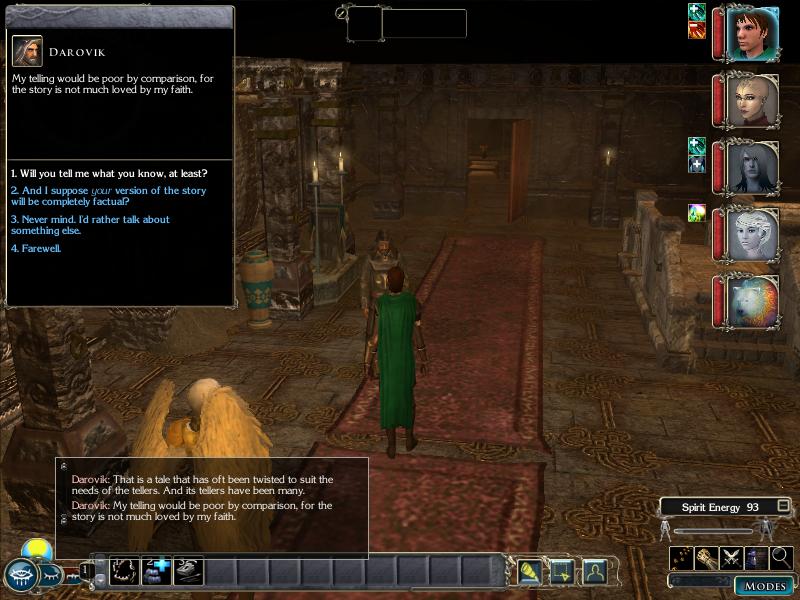
This is the follow-up to the clue we found in Okku's barrow - the book with the scribblings in the margins.
 : This temple has served three gods of the dead. In the days of Myrkul, the first of these gods, a priest called Akachi presided here.
: This temple has served three gods of the dead. In the days of Myrkul, the first of these gods, a priest called Akachi presided here. : Akachi turned against his god, and he marched an army to the gates of the City of Judgement. Such a thing should have been impossible... yet it was done.
: Akachi turned against his god, and he marched an army to the gates of the City of Judgement. Such a thing should have been impossible... yet it was done. : In the realm of the dead, Akachi the Betrayer sought to bring down the Wall of the Faithless. To tear it up from its roots, and set all the trapped souls free.
: In the realm of the dead, Akachi the Betrayer sought to bring down the Wall of the Faithless. To tear it up from its roots, and set all the trapped souls free. : The Wall of the Faithless? What is that?
: The Wall of the Faithless? What is that?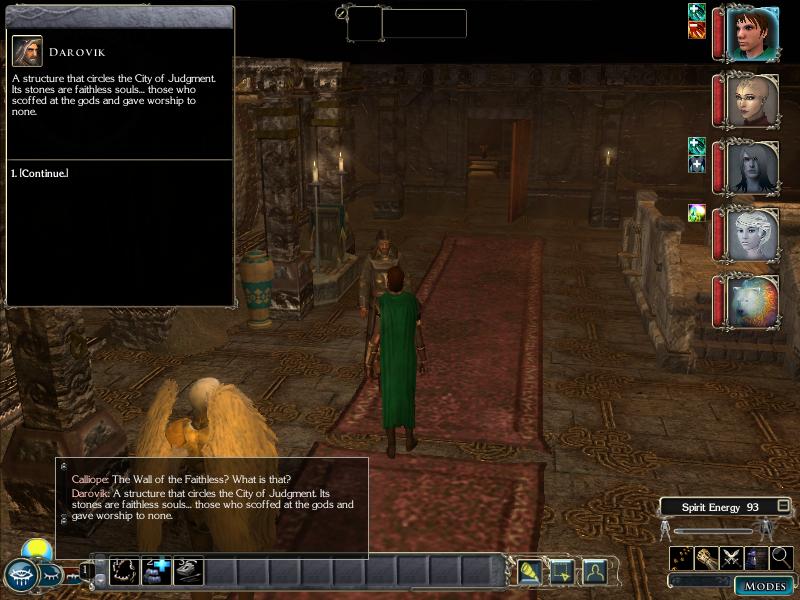
That's what the wall outside symbolises? No wonder the witches want to tear it down.
 : The Wall's mortar is a hungry, living mold that holds their souls fast, consumes their minds and their personalities... and finally absorbs them.
: The Wall's mortar is a hungry, living mold that holds their souls fast, consumes their minds and their personalities... and finally absorbs them. : Did Akachi succeed?
: Did Akachi succeed? : No. Mercifully, he did not. The Wall still stands, now as it did then.
: No. Mercifully, he did not. The Wall still stands, now as it did then. : [Bluff/Insight] That is not the whole truth, is it?
: [Bluff/Insight] That is not the whole truth, is it? : Nor is it a falsehood. I have told you what I know to be true. Anything more would be rumor... and not a rumor that serves my faith.
: Nor is it a falsehood. I have told you what I know to be true. Anything more would be rumor... and not a rumor that serves my faith. : Why would Akachi try to bring down the wall?
: Why would Akachi try to bring down the wall?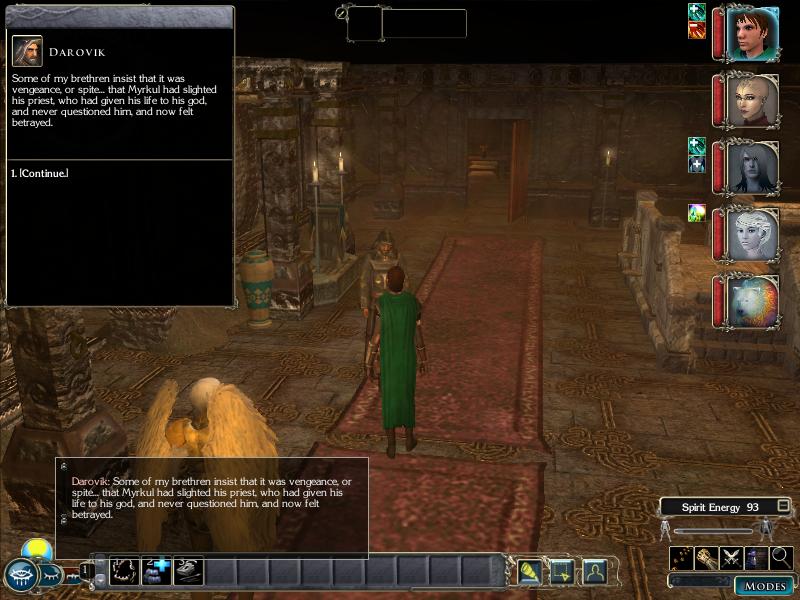
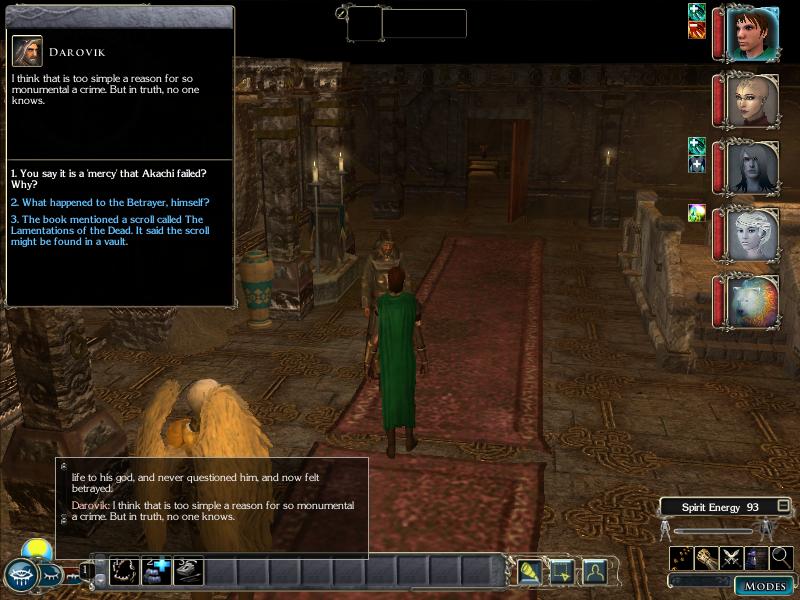
 : Because the planes are founded upon an order, a convenant between gods and mortals. The Wall is a symbol of that covenant, and to tear it down...
: Because the planes are founded upon an order, a convenant between gods and mortals. The Wall is a symbol of that covenant, and to tear it down... : Such an act would crack the foundations of the planes. It would be as if the sun failed to rise in the morn, or the seas fell upward into the sky.
: Such an act would crack the foundations of the planes. It would be as if the sun failed to rise in the morn, or the seas fell upward into the sky. : What happened to the Betrayer himself?
: What happened to the Betrayer himself? : Myrkul was a jealous, vengeful god. He did not reveal what punishements were bestowed upon the Betrayer, but I am certain they were worthy of his crime.
: Myrkul was a jealous, vengeful god. He did not reveal what punishements were bestowed upon the Betrayer, but I am certain they were worthy of his crime. : The book mentioned a scroll called The Lamentations of the Dead. It said the scroll might be found in a vault.
: The book mentioned a scroll called The Lamentations of the Dead. It said the scroll might be found in a vault.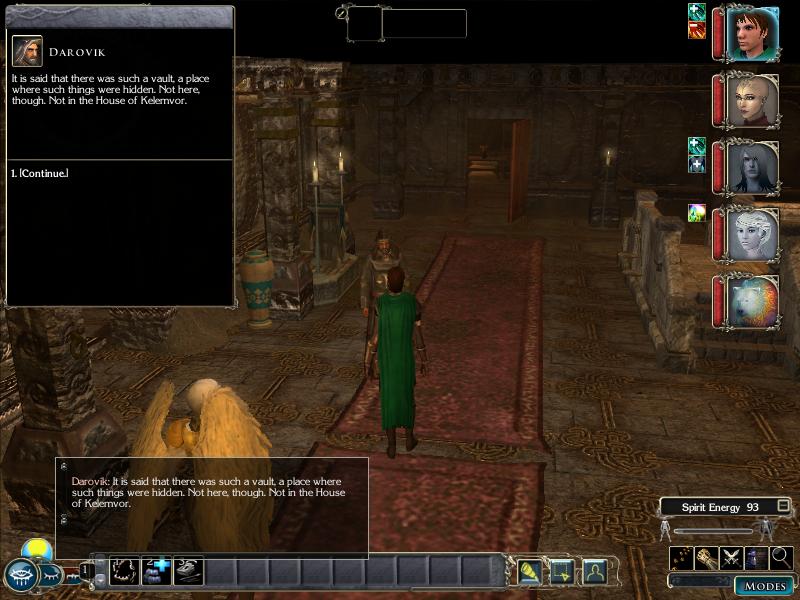
Ah. Yes, we know where he's talking about.
Before we speed off, though, we pick up a side-quest from Yusev the Acolyte:
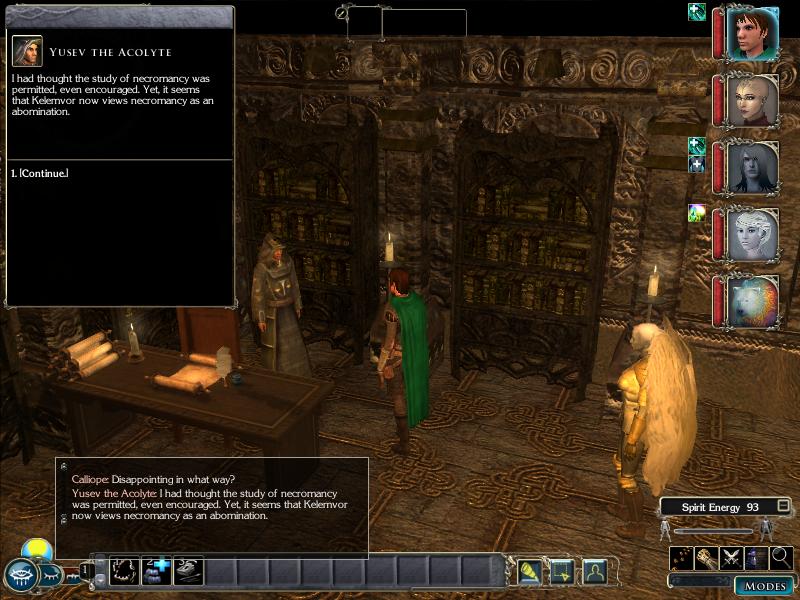
Yusev wants to live forever but necromancy is prohibited by Kelemvor. We could convince him to obey the Church, but that's no fun - and we're headed to Myrkul's library anyway, and there's bound to be a tome on immortality somewhere inside.
* * *
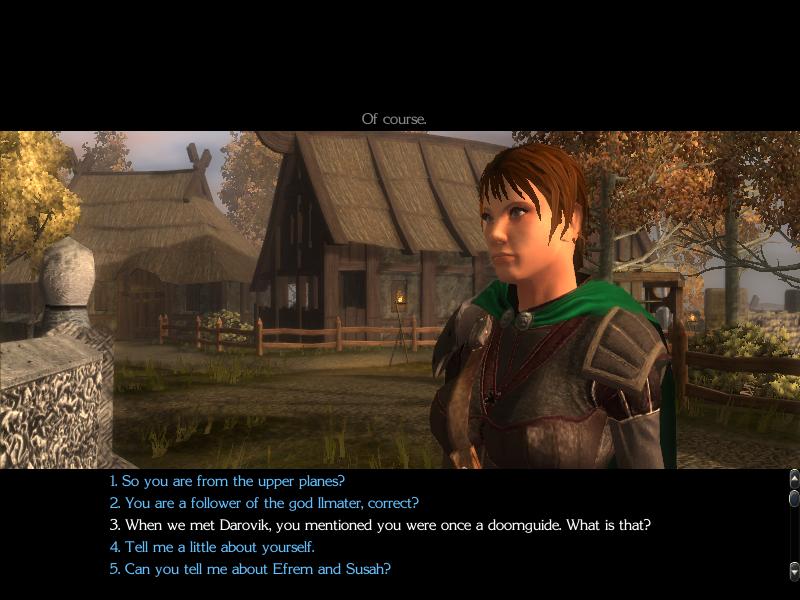
Okay, someone owes us an explanation, and for once we're in a position to collect.
So spill it, Kaelyn.
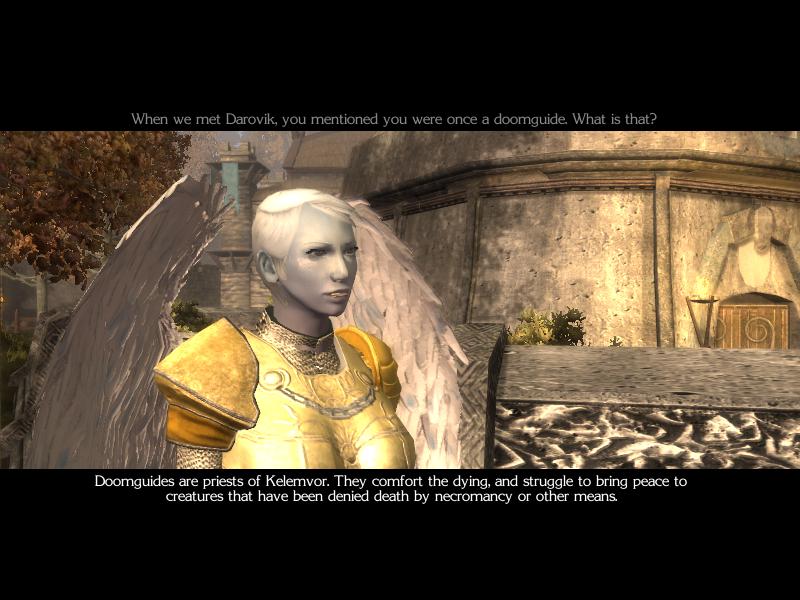
 : We are intended to bring peace to the dying and to the dead. We teach it is not something to be feared, but simply a natural ending to life.
: We are intended to bring peace to the dying and to the dead. We teach it is not something to be feared, but simply a natural ending to life. : What happened?
: What happened? : [Influence: Success] It is difficult to express, but I will try.
: [Influence: Success] It is difficult to express, but I will try. : Once I was one of the priesthood of Kelemvor, God of the Dead. I walked the planes alleviating the suffering of others.
: Once I was one of the priesthood of Kelemvor, God of the Dead. I walked the planes alleviating the suffering of others. : But...
: But...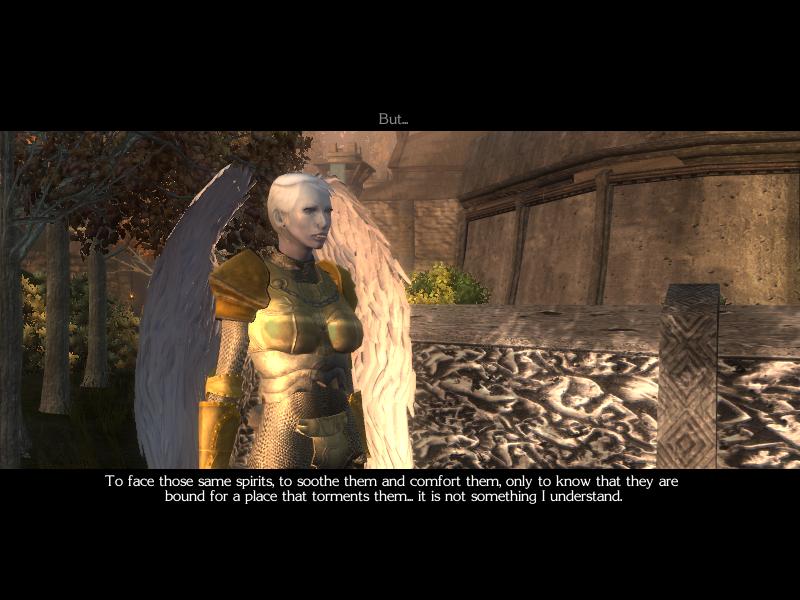
 : What do you mean?
: What do you mean? : In Kelemvor's faith, they teach that death is not something to be feared, that it is part of the natural cycle. But that is not true.
: In Kelemvor's faith, they teach that death is not something to be feared, that it is part of the natural cycle. But that is not true. : If one does not worship the gods, then there is much to fear - and no prospects of peace in the afterlife.
: If one does not worship the gods, then there is much to fear - and no prospects of peace in the afterlife. : No prospects of peace? I don't understand.
: No prospects of peace? I don't understand.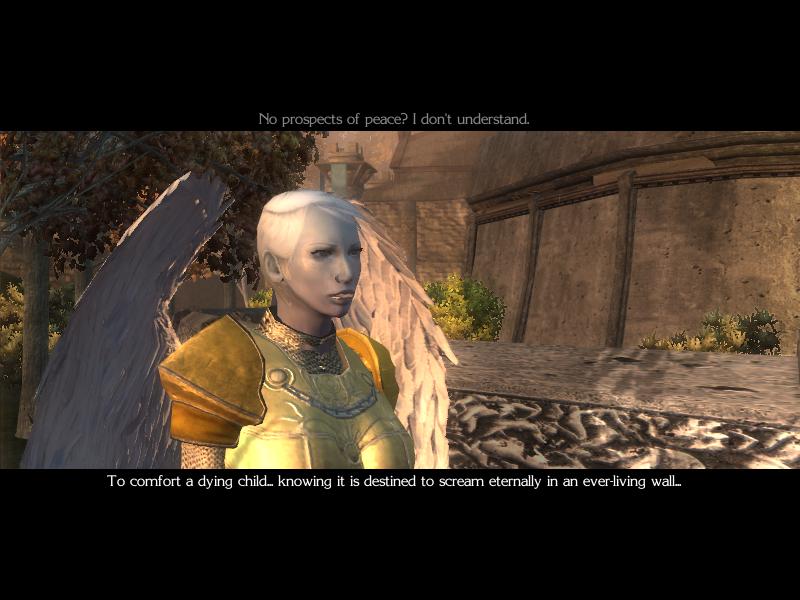
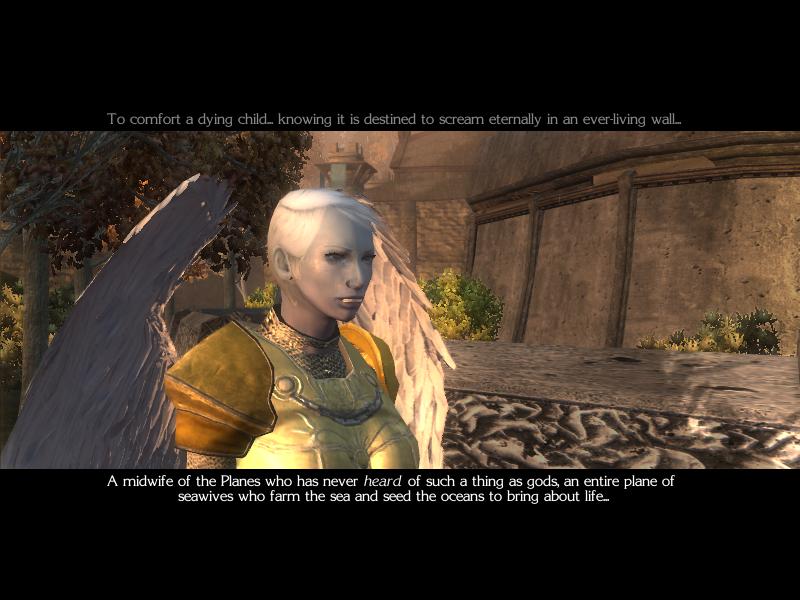
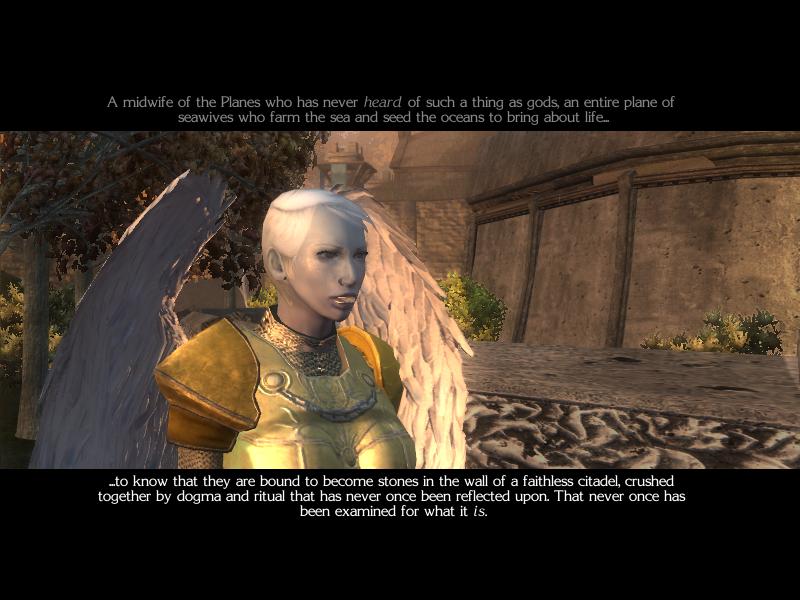
 : You're speaking of the Wall of the Faithless.
: You're speaking of the Wall of the Faithless.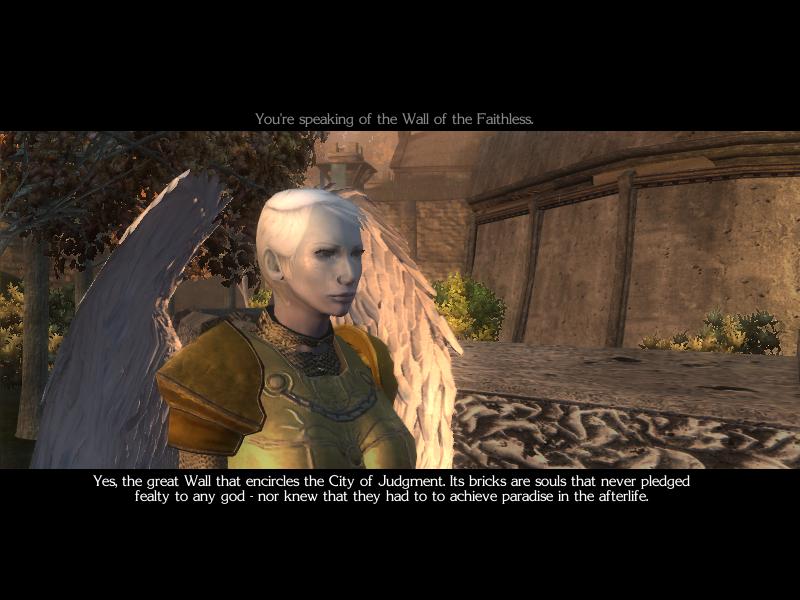
Aha. This is Kaelyn's beef with Kelemvor. This is the reason for her conversion to Ilmater.
Also detecting echoes of the "atheist islander" argument. You know... a civilisation of tropical islanders doomed to suffer eternally in Hell because they had the temerity to live and die before missionaries could discover their homeland (you might also hear of it in the form of miscarried babies). The idea is to prove God is unjust because of his preconditions for salvation, although usually these arguments are handwaved away with suspect theology.
 : They are mortared there, crushed together to suffer by archaic law. No matter how good, or pure, or unselfish they were - it matters only if they followed the proper rituals to a deity, any deity.
: They are mortared there, crushed together to suffer by archaic law. No matter how good, or pure, or unselfish they were - it matters only if they followed the proper rituals to a deity, any deity. : You value one's deeds and heart over their devotion, then.
: You value one's deeds and heart over their devotion, then. : Religion is not ritual. It is intended to comfort, to strengthen, not to punish.
: Religion is not ritual. It is intended to comfort, to strengthen, not to punish. : Is lip service to a god... is that what is important? Or is it the acts and belief that matter?
: Is lip service to a god... is that what is important? Or is it the acts and belief that matter?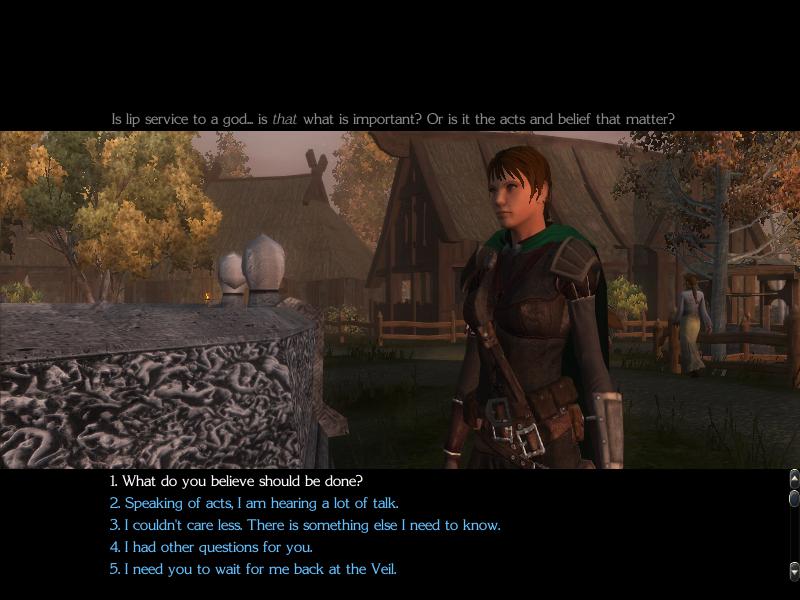
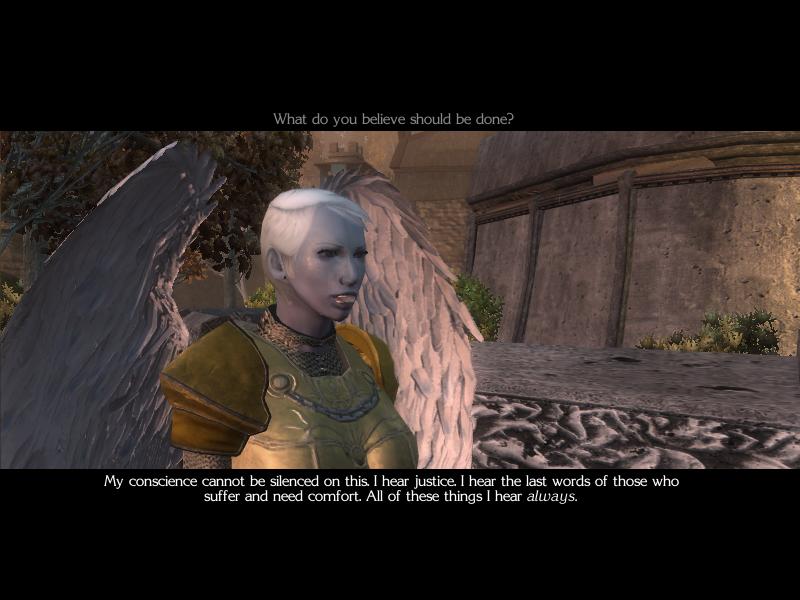
 : But beyond them, in the Fugue Plane, I hear the cries of those dead who lie within the wall. And I cannot forsake them.
: But beyond them, in the Fugue Plane, I hear the cries of those dead who lie within the wall. And I cannot forsake them. : To travel to the city of the dead is not an easy journey, one few have attempted, and fewer have survived.
: To travel to the city of the dead is not an easy journey, one few have attempted, and fewer have survived. : My spirit cannot survive if I do not make such a journey.
: My spirit cannot survive if I do not make such a journey. : I will fly to them, and I will grant them wings as I have. I shall release them from the curse that their death has become.
: I will fly to them, and I will grant them wings as I have. I shall release them from the curse that their death has become. : Because it is the right thing to do for one's spirit to be at peace.
: Because it is the right thing to do for one's spirit to be at peace. : What do you intend to do?
: What do you intend to do?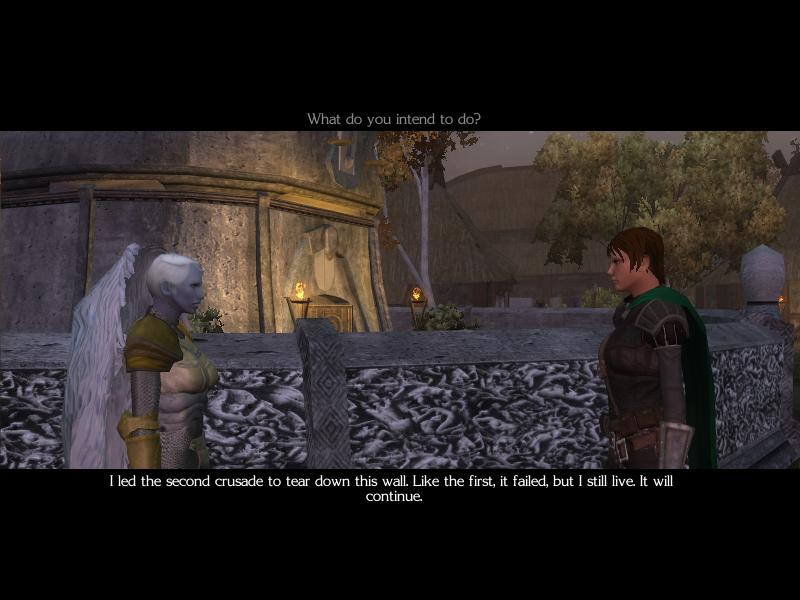
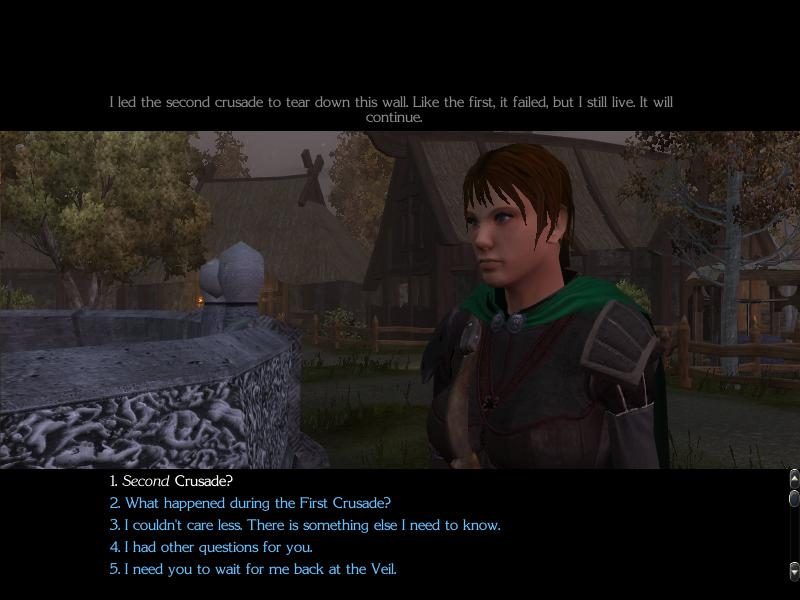
 : Yes. There was a first crusade. It, too, was stalled for a time.
: Yes. There was a first crusade. It, too, was stalled for a time. : The one who led it suffered as I had. That is part of the journey, I feel.
: The one who led it suffered as I had. That is part of the journey, I feel. : What happened during the First Crusade?
: What happened during the First Crusade?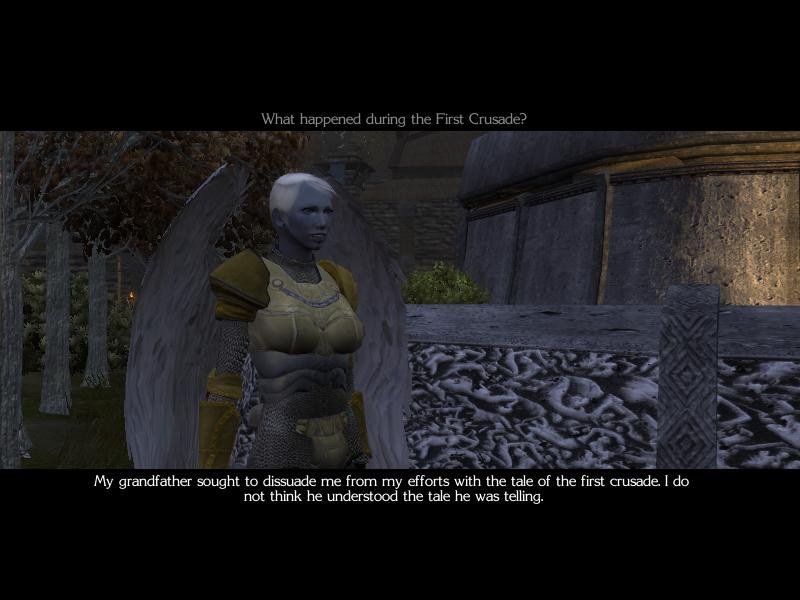
Uh, that's not what I asked, but okay!
 : Before then, I did not even know that there had been previous attempts to bring down the Wall. To realize that others had felt as I did gave me a new strength - new conviction.
: Before then, I did not even know that there had been previous attempts to bring down the Wall. To realize that others had felt as I did gave me a new strength - new conviction. : Who led the Crusade?
: Who led the Crusade? : One mortal sought to cast down the wall and failed, even with an army at his back. His name was Akachi, sometimes known as the Betrayer.
: One mortal sought to cast down the wall and failed, even with an army at his back. His name was Akachi, sometimes known as the Betrayer. : Why did your grandfather tell you such a tale?
: Why did your grandfather tell you such a tale?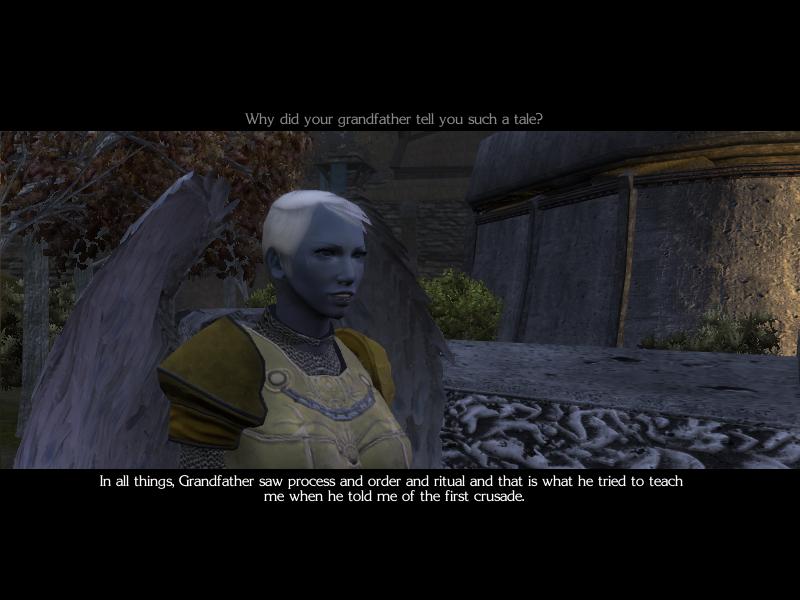
 : But those are abstracts that orbit a purpose. If the purpose is flawed... what meaning do process and ritual have?
: But those are abstracts that orbit a purpose. If the purpose is flawed... what meaning do process and ritual have? : After your grandfather told you the tale, what did you say?
: After your grandfather told you the tale, what did you say? : Only one question remained in my mind, so I spoke it. "Why must the universe be so?"
: Only one question remained in my mind, so I spoke it. "Why must the universe be so?" : Grandfather answered, resolved, with "what is there to be done."
: Grandfather answered, resolved, with "what is there to be done."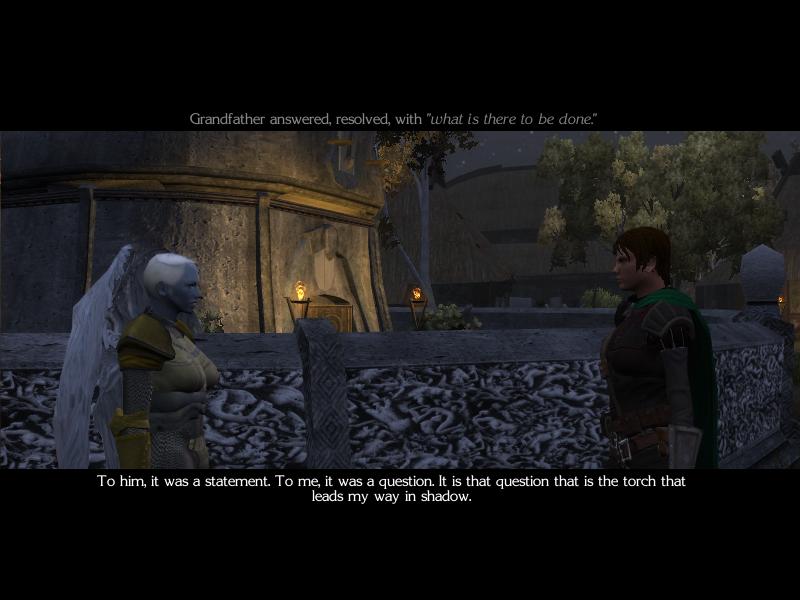
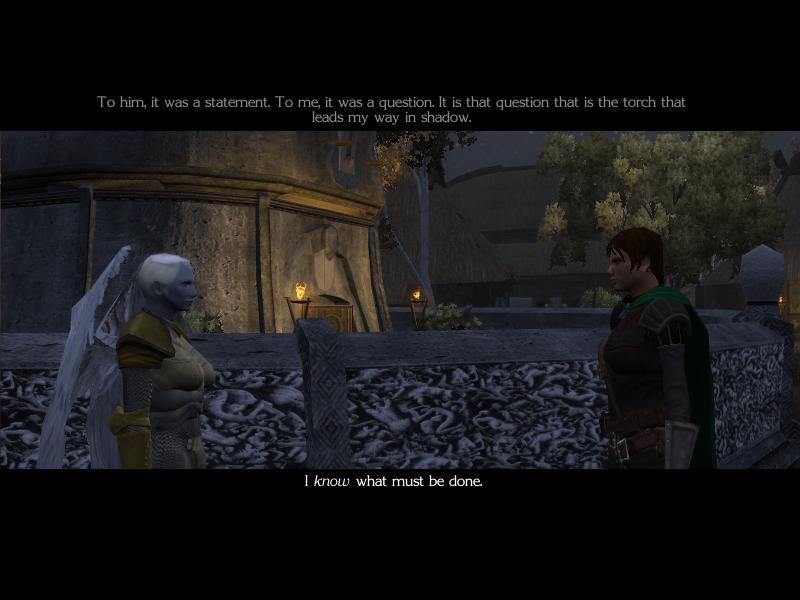
Kaelyn's problem is that she's (now) Neutral Good and Kelemvor's Lawful Neutral.
The Wall of the Faithless is cruel - nobody deserves centuries of agony ended only by utter oblivion. To Kaelyn, the Wall is unnecessary because cruel things should not exist, because cruelty is not Good.
To Kelemvor and his Church, the Wall is also unnecessary... because nobody would end up in it if they just believed in the gods. Those unfortunates who do get caught out by the system are to be pitied, but ultimately the preservation of order in the heavens is more important than a few souls here and there. And most of them are there by their own fault anyway, so there.
Tearing down the Wall of the Faithless is Kaelyn's big ambition in life; this is what she was working towards when we found her in the Death God's Vault. It's a sympathetic goal, but there are several reasons it's a bad idea - some good, some not so good (if anyone mentions that the Wall only applies to Faerunians and not to people from other planes I will slap you).
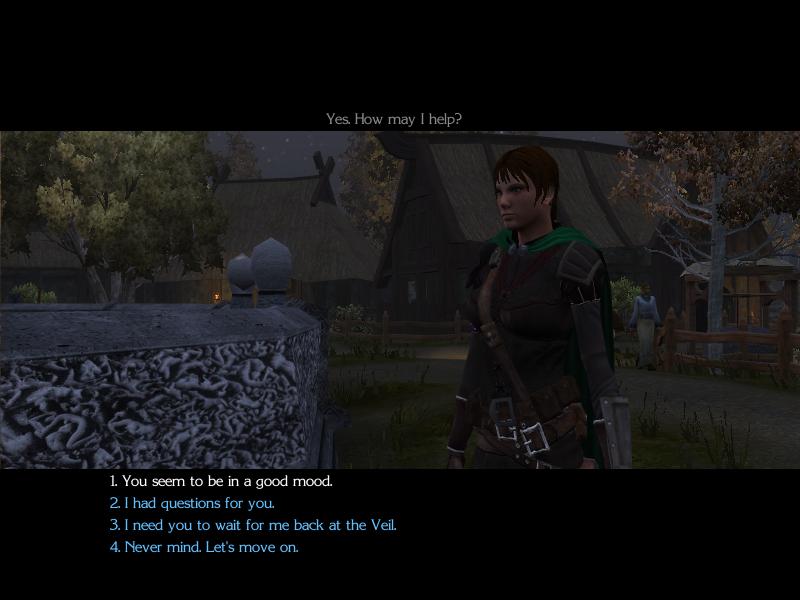
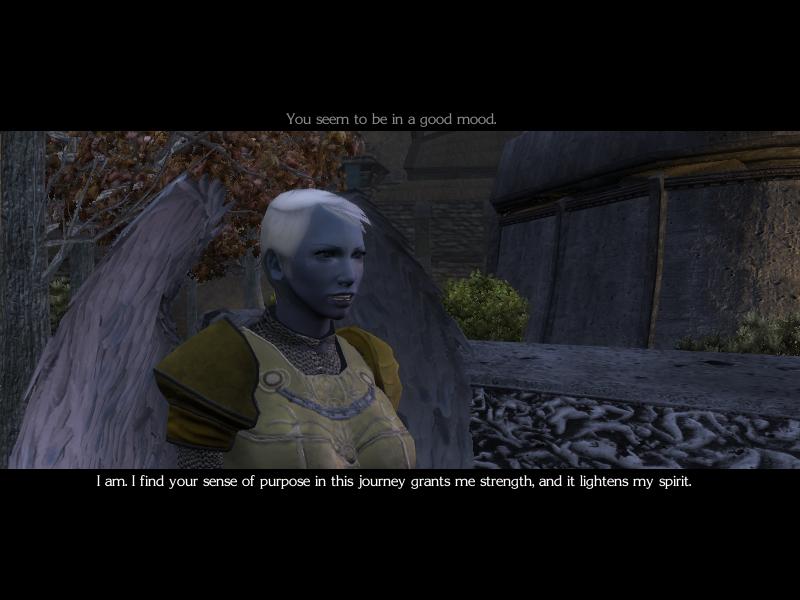
 : Sense of purpose?
: Sense of purpose? : Whatever drives you has driven me as well. I feel there is much I can learn from you, and I thank the planes our paths crossed.
: Whatever drives you has driven me as well. I feel there is much I can learn from you, and I thank the planes our paths crossed. : Are you sure?
: Are you sure? : I speak the truth. Do such words trouble you?
: I speak the truth. Do such words trouble you?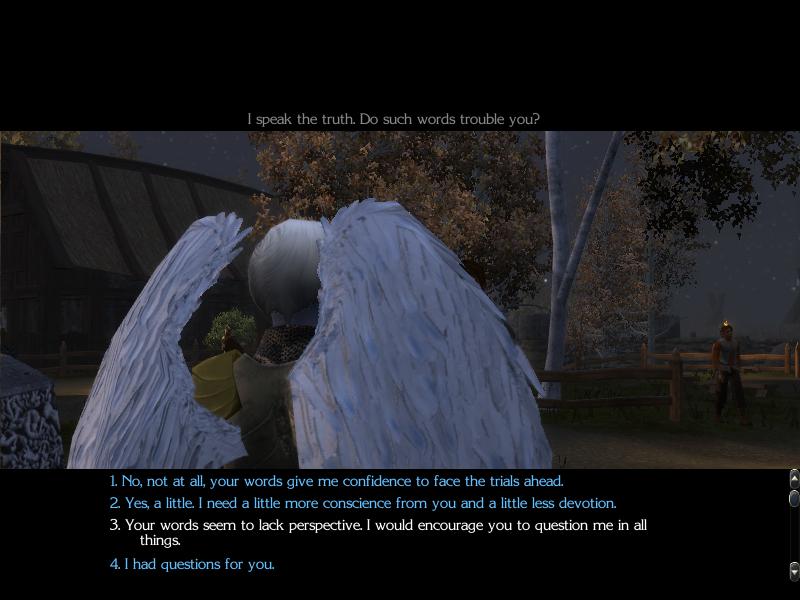
Kaelyn seems like a nice lady so we'll do her a solid by reminding her we're Lawful Evil.
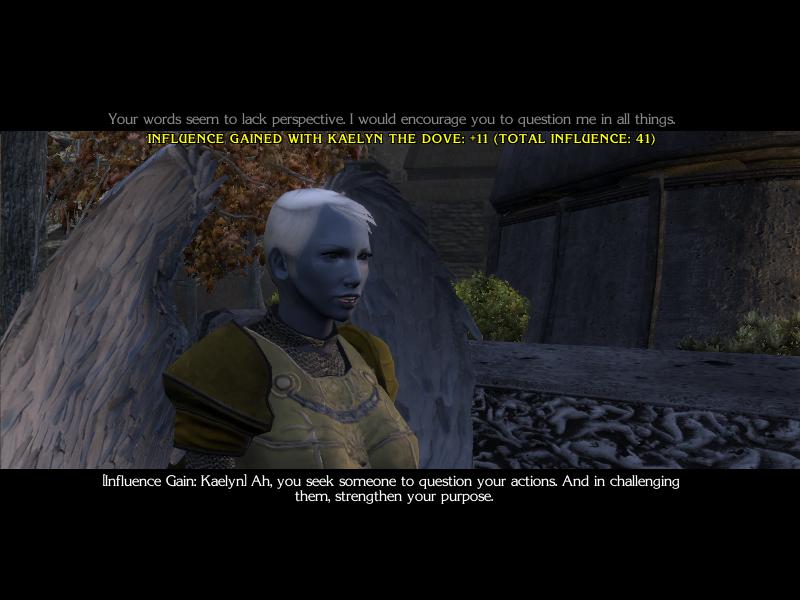
for fuck's sake woman
 : It is a form of healing we use... used... for those who doubted their intentions in the House of the Triad. Debate can be a form of healing, for insecurity and for doubt.
: It is a form of healing we use... used... for those who doubted their intentions in the House of the Triad. Debate can be a form of healing, for insecurity and for doubt. : I shall endeavor to help you in such a way. And I am pleased you asked.
: I shall endeavor to help you in such a way. And I am pleased you asked.There's more to come with regards to Kaelyn and her pilgrimage. We'll come back to her when we're more aware of the connections between a game called Mask of the Betrayer and a man called Akachi the Betrayer.
* * *
I'd like to tell you a story now. It's a story I found in the game Baldur's Gate; in exchange for running errands for him in Beregost, the mage Firebead Elvenhair gives the protagonist a book entitled The Dead Three. This is the story I'd like to tell you today.
It's a scary story, mind, so ask your parents' permission before reading!
Are you sitting comfortably?
Then I'll begin.
quote:
In ages past there was but one god of strife, death, and the dead, and he was known as Jergal, Lord of the End of Everything. Jergal fomented and fed on the discord among mortals and powers alike. When beings slew each other in their quest for power or in their hatred, he welcomed them into his shadowy kingdom of eternal gloom. As all things died, everything came to him eventually, and over time he built his power into a kingdom unchallenged by any other god. Eventually, however, he grew tired of his duties for he knew them too well.
Without challenge there is nothing, and in nothingness there is only gloom. In such a state, the difference between absolute power and absolute powerlessness is undetectable. During this dark era, there arose three powerful mortals - Bane, Bhaal, and Myrkul - who lusted after the power Jergal wielded. The trio forged an unholy pact, agreeing that they would dare to seek such ultimate power or die in the attempt. Over the length and breadth of the Realms they strode, seeking powerful magic and spells and defying death at every turn. No matter what monster they confronted or what spells they braved, the three mortals emerged unscathed at every turn. Eventually the trio destroyed one of the Seven Lost Gods, and they each seized a portion of his divine essence for themselves. The trio then journeyed into the Gray Waste and sought out the Castle of Bone.
Through armies of skeletons, legions of zombies, hordes or noncorporeal undead, and a gauntlet of liches they battled. Eventually they reached the object of their lifelong quest - the Bone Throne. "I claim this throne of evil," shouted Bane the tyrant. ''I'll destroy you before you can raise a finger," threatened Bhaal the assassin. ''And I shall imprison your essence for eternity," promised Myrkul the necromancer. Jergal arose from his throne with a weary expression and said, "The Throne is yours. I have grown weary of this empty power. Take it if you wish - I promise to serve and guide you as your seneschal until you grow comfortable with the position."
Before the stunned trio could react, the Lord of the Dead continued, "who among you shall rule?" The trio immediately fell to fighting amongst themselves while Jergal looked on with indifference. When eventually it appeared that either they would all die of exhaustion or battle on for an eternity, the Lord of the End of Everything intervened. "After all you have sacrificed, would you come away with nothing? Why don't you divide the portfolios of the office and engage in a game of skill for them?" asked Jergal. Bane, Bhaal, and Myrkul considered the god's offer and agreed. Jergal took the heads of his three most powerful liches and gave them to the trio that they would compete by bowling the skulls. Each mortal rolled a skull across the Gray Waste, having agreed that the winner would be he who bowled the farthest.
Malar the Beastlord arrived to visit Jergal at this moment. After quickly ascertaining that the winner of the contest would get all of Jergal's power, he chased off after the three skulls to make sure that the contest would be halted until he had a chance to participate for part of the prize. Bane, Bhaal, and Myrkul again fell to fighting, as it was obvious their sport was ruined, and again Jergal intervened. "Why don't you allow Lady Luck to decide so you don't have to share with the Beast?"
The trio agreed, and Jergal broke off his skeletal finger bones and gave them to the players. When Malar returned form chasing the skulls, he found that the trio had just finished a game of knucklebones. Bane cried out triumphantly, "As winner, I choose to rule for all eternity as the ultimate tyrant. I can induce hatred and strife at my whim, and all will bow down before me while in my kingdom." Myrkul, who had won second place, declared, "But I choose the dead, and by doing so I truly win, because all you are lord over, Bane, will eventually be mine. All things must die - even gods."
Bhaal, who finished third, demurred, "I choose death, and it is by my hand that all that you rule, Lord Bane, will eventually pass to Lord Myrkul. Both of you must pay honor to me and obey my wishes, since I can destroy your kingdom, Bane, by murdering your subjects, and I can starve your kingdom, Myrkul, by staying my hand." Malar growled in frustration, but could do nothing, and yet again only the beasts were left for him. And Jergal merely smiled, for he had been delivered.
Bane, Myrkul and Bhaal, also known as the Dead Three, were the big assholes of the Forgotten Realms. I say "were" because all three died during the Time of Troubles (some soap opera drama that was caused by Bane and Myrkul being, well, assholes). I say "died," Bane and Myrkul are still alive - Bane possessed his demi-god son, the improbably-named Iyachtu Xvim, and returned to full strength, while according to some shitty Forgotten Realms novel, Myrkul lives on in some magic crown, plotting his revenge.
(It's a dumb idea and you should seriously forget I mentioned it.)
Oh, Bhaal had a contingency plan too, but he messed up or something and is dead forver. It's not important.
What is important is that you're familiar with what passes for theology in the Forgotten Realms. Jergal was a nice-ish god of the dead but got bored. He gave the job to Myrkul, who was a massive dick about it, scaring people and encouraging necromancy. Myrkul died and generic-antagonist-god Cyric briefly took the role before he was replaced by Kelemvor, another former mortal, now last and current god of the dead. Kelemvor's more like Jergal in that they just watch over the dead and keep order in the afterlife; Myrkul, on the other hand, had ambitions.
It's a big bunch of jibber-jabber but Mask manages to do something interesting with it so don't give up on the game just yet!
* * *
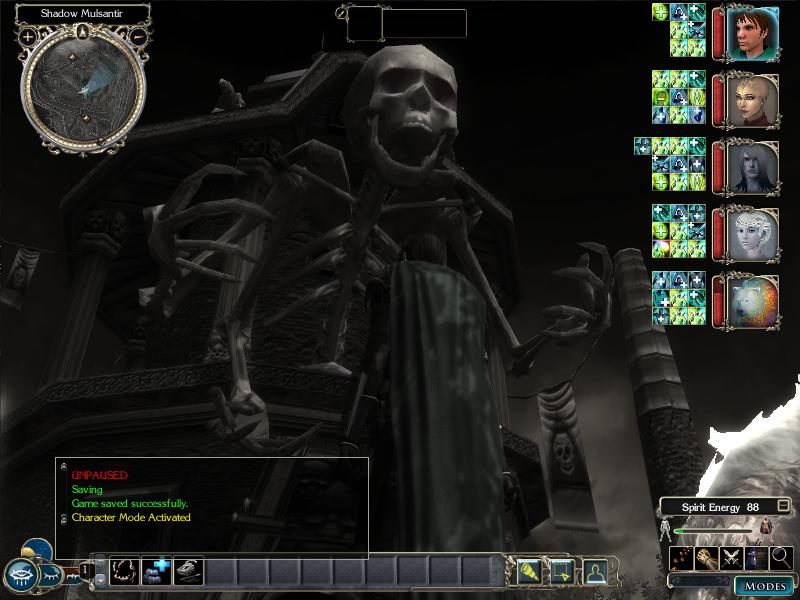
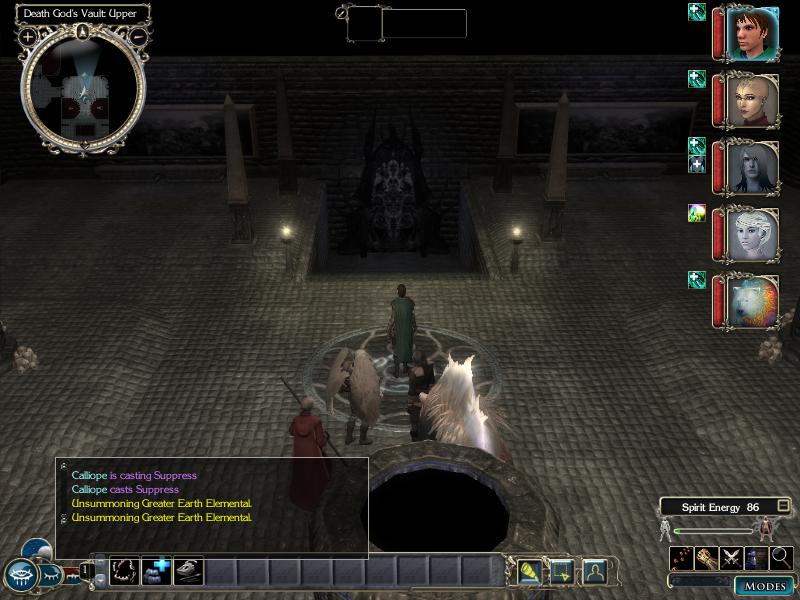
Death God's Vault
We return to the Plane of Shadows to complete this little side-quest.
We could have done most of this during Act 1 - it would have been a little more difficult but ultimately still possible. However, the end of the quest requires the use of spirit-eater powers, so I've waited until now to explore Myrkul's complex.
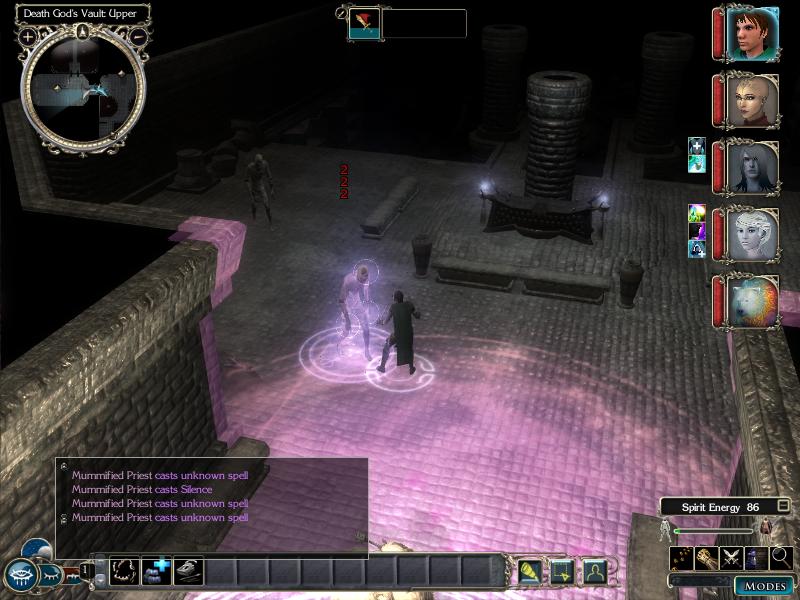
The level is littered with Mummified Priests. Their Cleric spells are potent but they are all incredibly vulnerable to fire damage.
The jars you see scattered around the place are offering urns. They contain several hundred gold pieces but spawn a Dread Wraith when disturbed.
Sorry, that should have read "They spawn a Dread Wraith when disturbed, but only contain several hundred gold pieces," because reliably-spawning Dread Wraiths are an excellent source of Spirit Energy and much better than some measly gold.
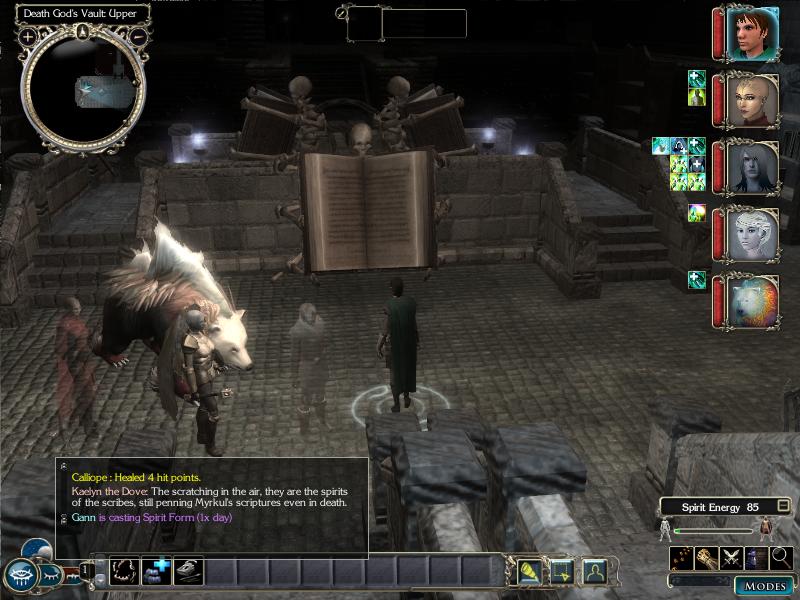
Beyond the mummies is a vast library (not the one we're looking for).
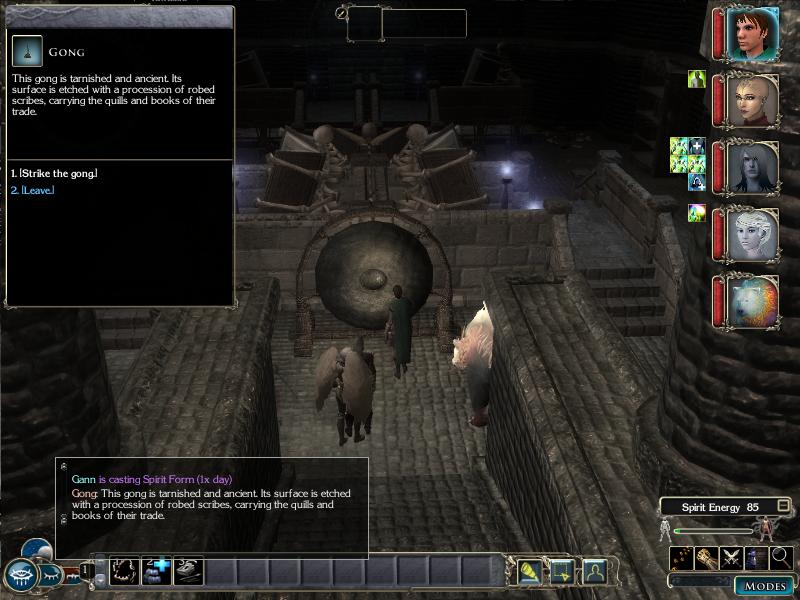
 : [As the sound of the gong reverberates, several ghostly scribes materialize throughout the Scriptorium].
: [As the sound of the gong reverberates, several ghostly scribes materialize throughout the Scriptorium].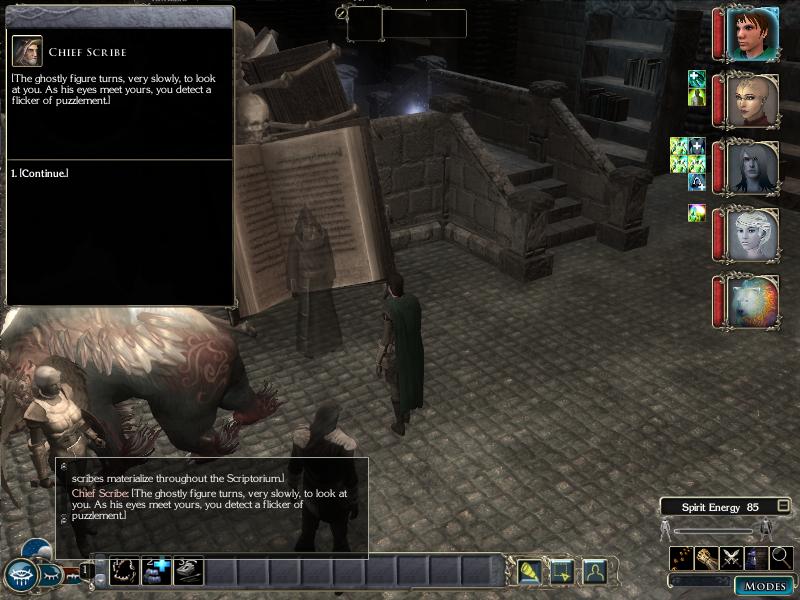
 : A tale of deception is writ plain upon your soul, supplicant. And you are both the deceiver... and the deceived.
: A tale of deception is writ plain upon your soul, supplicant. And you are both the deceiver... and the deceived. : You will not find truth within these walls. But when you see the lies for what they are, you will return to us, I think.
: You will not find truth within these walls. But when you see the lies for what they are, you will return to us, I think. : I don't understand. Can you speak plainly?
: I don't understand. Can you speak plainly? : I cannot. My eyes are trained to read the words, and discard the meanings. Thus it has always been.
: I cannot. My eyes are trained to read the words, and discard the meanings. Thus it has always been.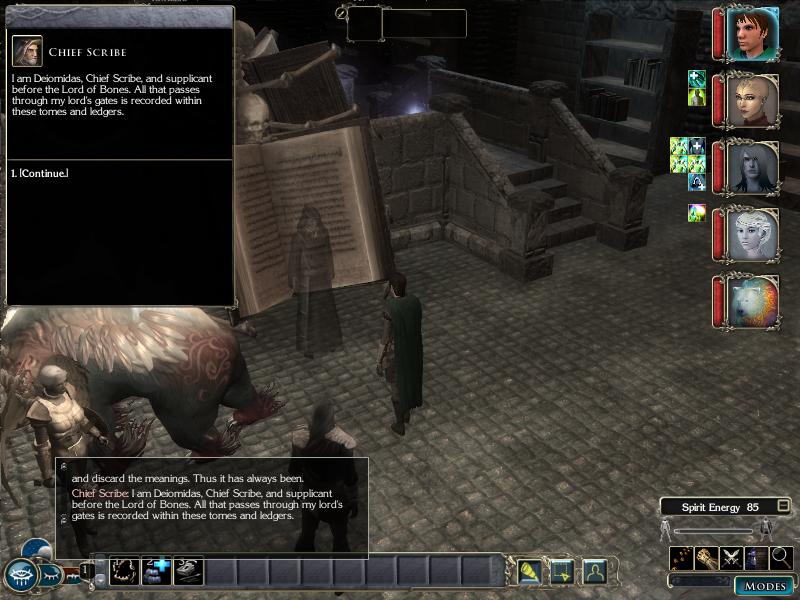
Ah, yes, the Book of the Dead. Of course, the actual Egyptian Book of the Dead was called Spells of Going Forth by Day and was simply a text on funerary rites. This particular book reminds me more of The Book of Life and Death from the story of Sun Wukong (AKA the Monkey King, or simply Monkey) in the sixteenth-century Chinese novel Journey to the West. In the story, Monkey tears his name out of The Book of Life and Death so that he cannot be killed, then runs amok upsetting people until the Buddha arrives to put him in his place.
Not that we can futz around with immortality here, but that is the influence behind the Deiomidas character. More generally, it's the inspiration behind the afterlife-as-bureaucracy of Jergal's and Kelemvor's time as god of the dead (I'll stop pretending to be highbrow now and cite Torment's Dhall and the 1988 comedy film Beetlejuice starring Michael Keaton as other examples).
But it's a bit weird to hear that Deiomidas is a Myrkulite. Jergal and Kelemvor have always been presented as 'lord of the underworld' in the manner of Osiris or Hades, but Myrkul always struck me as more like a death-god straight out of Conan or other pulp fantasy.
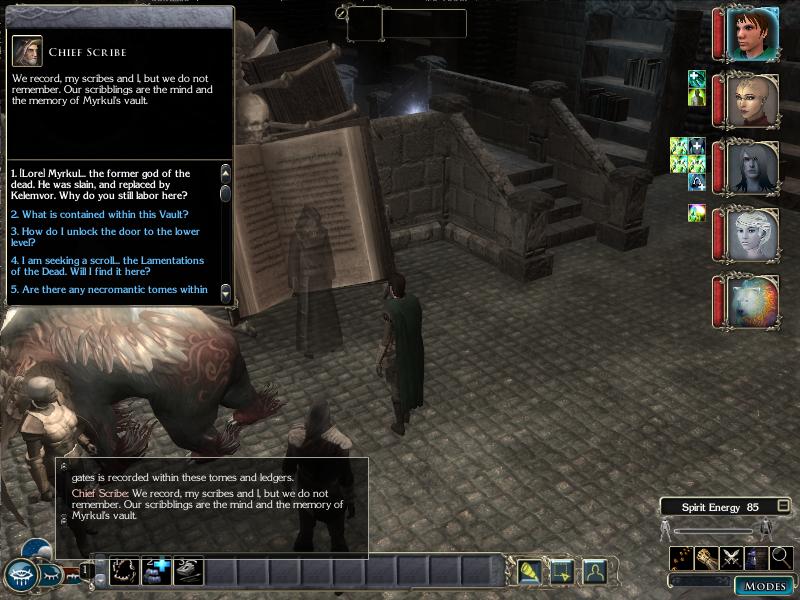
 : It is words that bind us to the Vault of our lord. Our souls are graven upon its walls, our names writ upon its foundation stones.
: It is words that bind us to the Vault of our lord. Our souls are graven upon its walls, our names writ upon its foundation stones. : When one scribe replaced another, the name of the old scribe would be wiped clean, and he would be free to pass beyond, to the City of Judgement, to join with the Scriveners who came before.
: When one scribe replaced another, the name of the old scribe would be wiped clean, and he would be free to pass beyond, to the City of Judgement, to join with the Scriveners who came before. : But a great betrayal was committed here, supplicant, and we stood by and watched... so taken were we with the traitor's resolve... with the dream that he spun for us, in words and deeds.
: But a great betrayal was committed here, supplicant, and we stood by and watched... so taken were we with the traitor's resolve... with the dream that he spun for us, in words and deeds.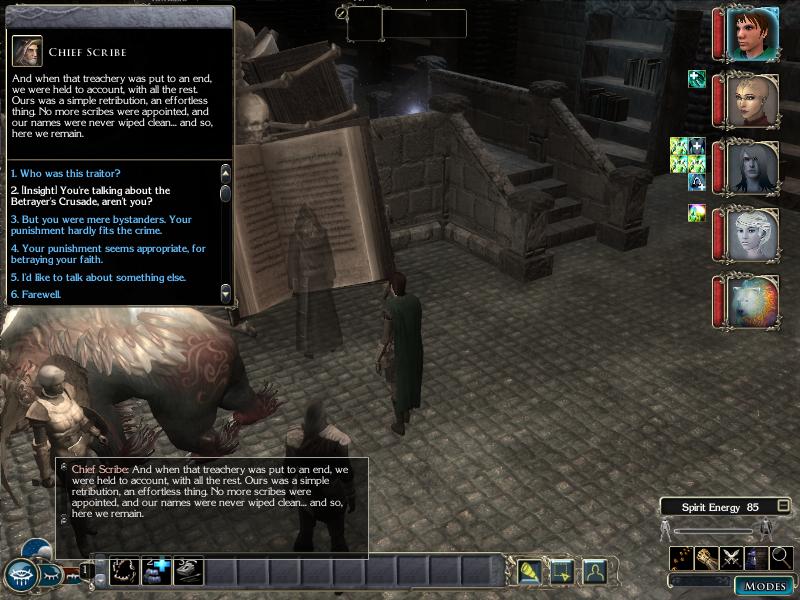
 : That is what we called our treachery, yes. A pretty mask... to hide an ugly face.
: That is what we called our treachery, yes. A pretty mask... to hide an ugly face. : Who was this traitor?
: Who was this traitor? : Akachi... high priest of the temple. He is called, by some, the Betrayer, who led a great host against the City of Judgement.
: Akachi... high priest of the temple. He is called, by some, the Betrayer, who led a great host against the City of Judgement. : For the love we bore him, we shut our eyes to his treachery. And for that reason, we stand before you now.
: For the love we bore him, we shut our eyes to his treachery. And for that reason, we stand before you now. : But you were mere bystanders. Your punishment hardly fits the crime.
: But you were mere bystanders. Your punishment hardly fits the crime.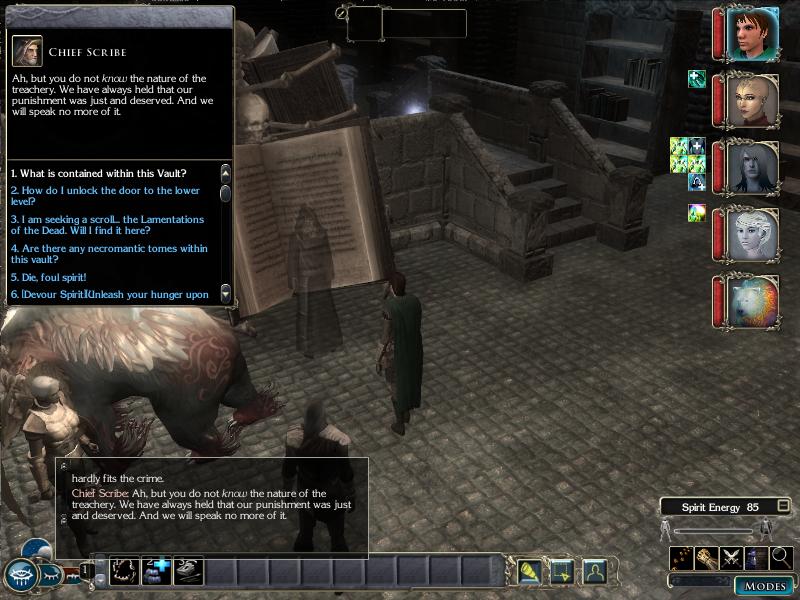
Deiomidas tells us about the Vault's contents: the tomes held within the secure archives (including several necromantic works and our Lamentations of the Dead scroll), the mummified bodies of old priests, and many prisoners of Myrkul. Lots of enemies of the faith, yes, but also many thieves, murderers and rapists.
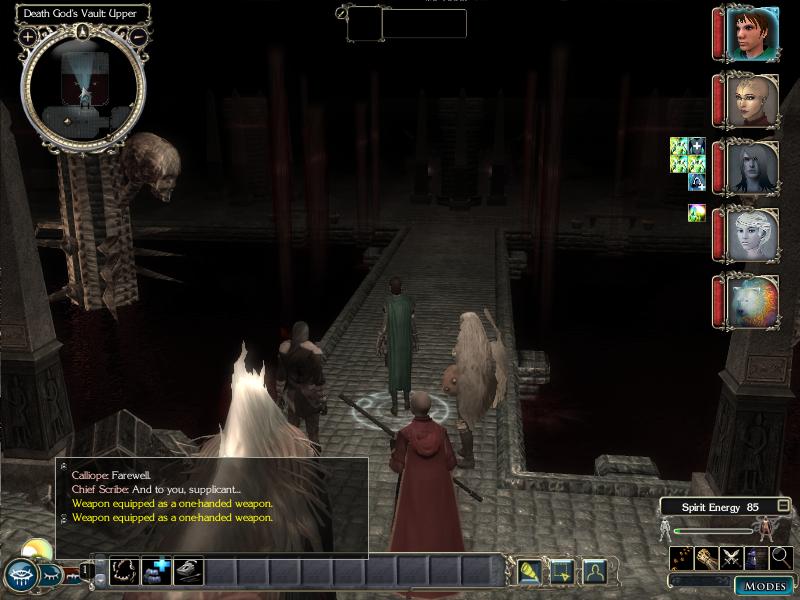
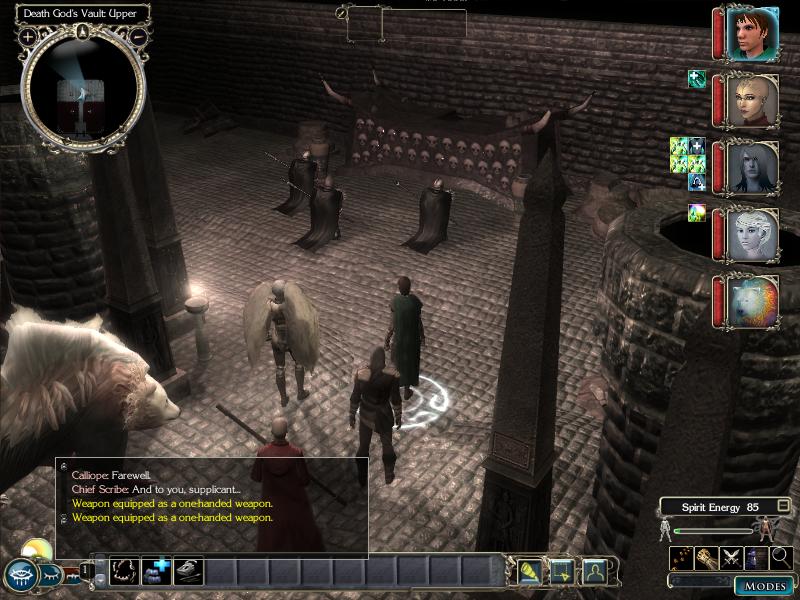
North we find a trio of Death Knights praying. They attack us for interrupting their ablutions.
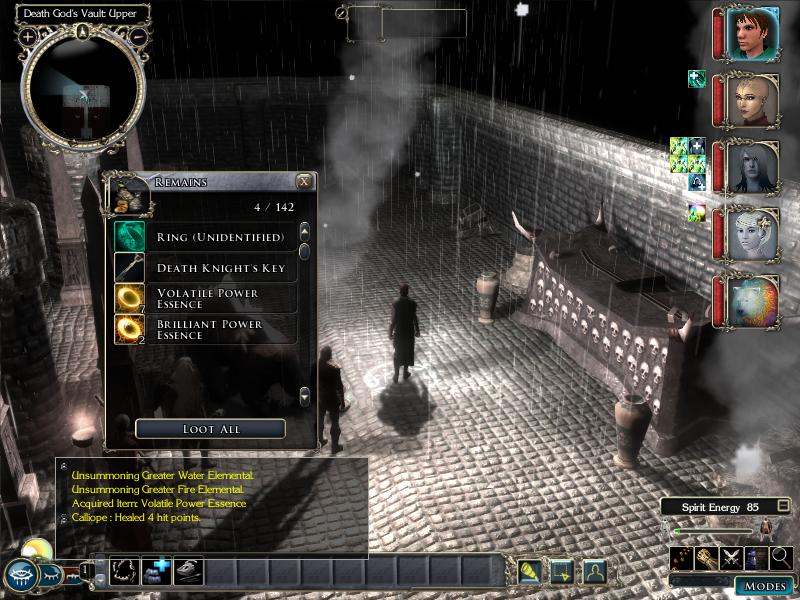
It would have been a difficult fight if we'd come here in Act 1, since the Death Knights' scythes are very nasty weapons. But there's five of us now and we're overleveled, so we don't even break a sweat.
Obsidian were aware of how incredibly easy (if repetitive) NWN2 was, so they made an effort to up the difficulty in Mask. Most of the core path is very easy, but there are a number of optional fights and dungeons that can be a major challenge when you first encounter them.
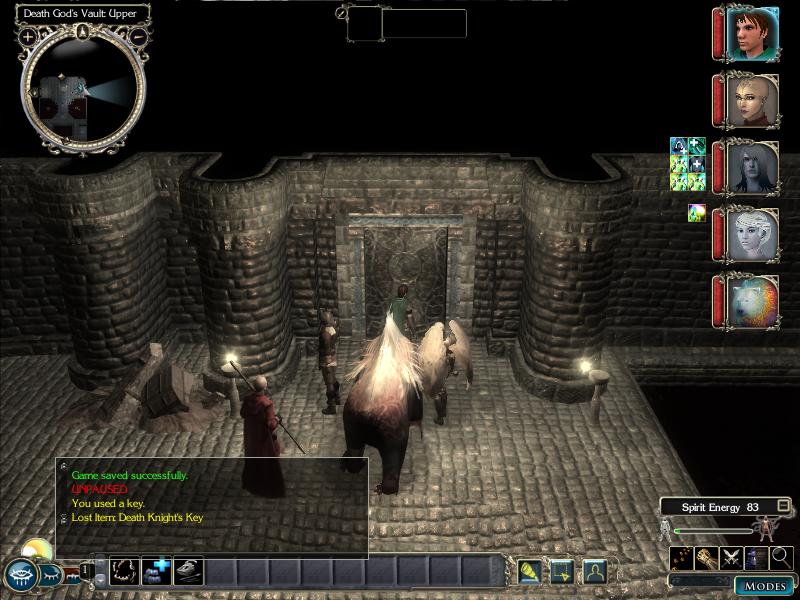
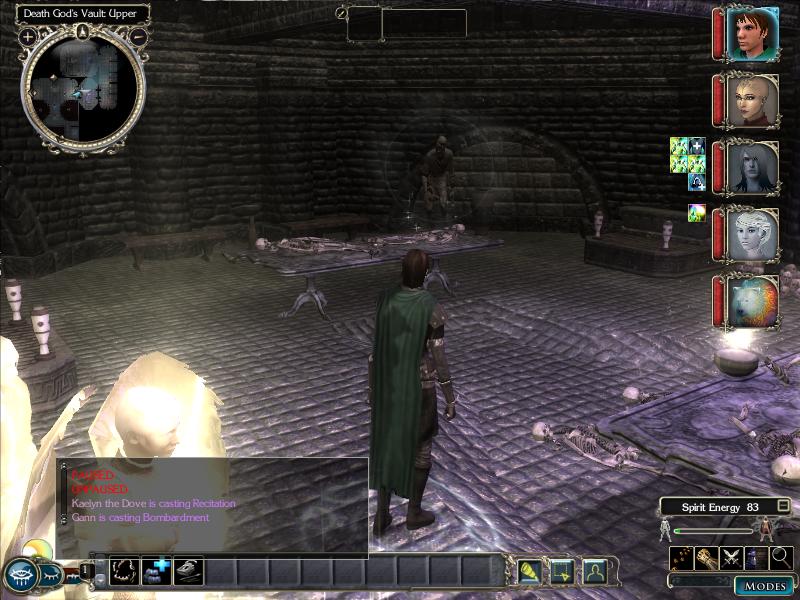
The key opens a second passage back in the main hall of the Vault. This must be the funerary wing.
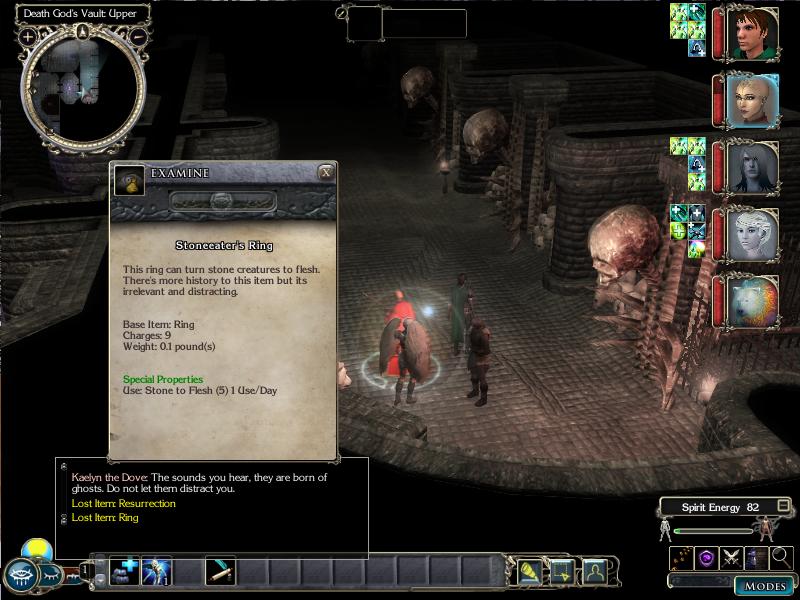

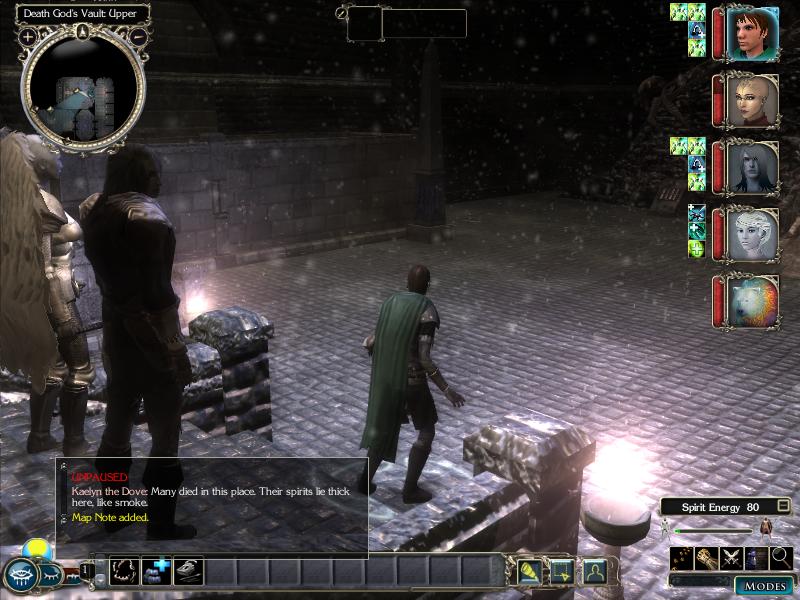
At the end of the wing is a large chamber filled with gently-drifting snowflakes. It's very pretty.
Wait, what did you say, Kaelyn?
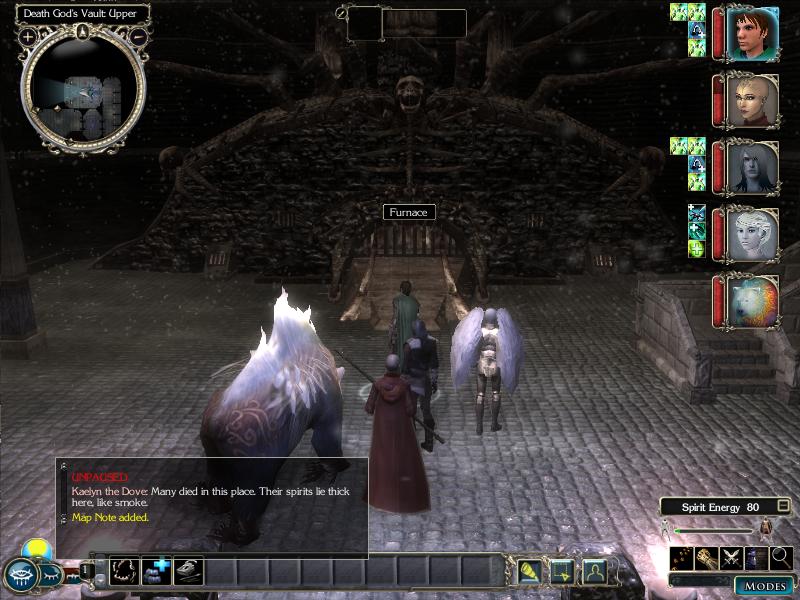
Oh ick.
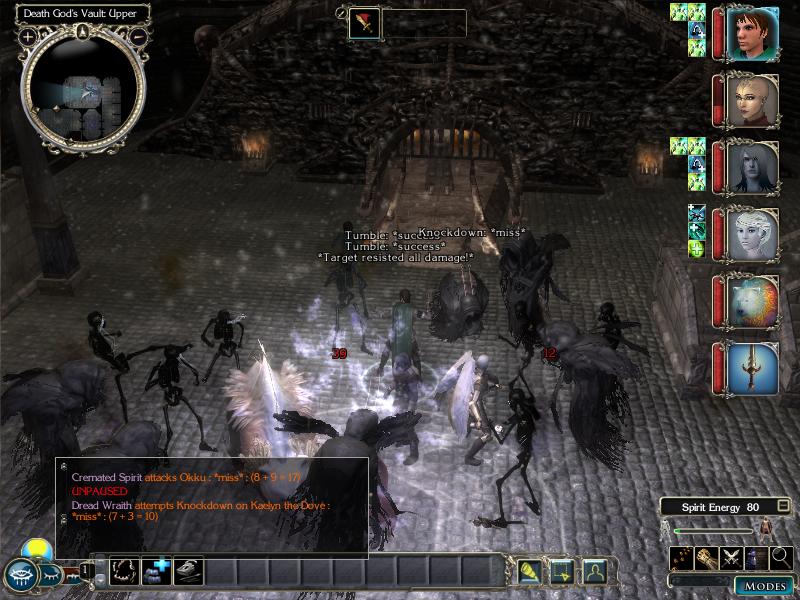
Double ick!
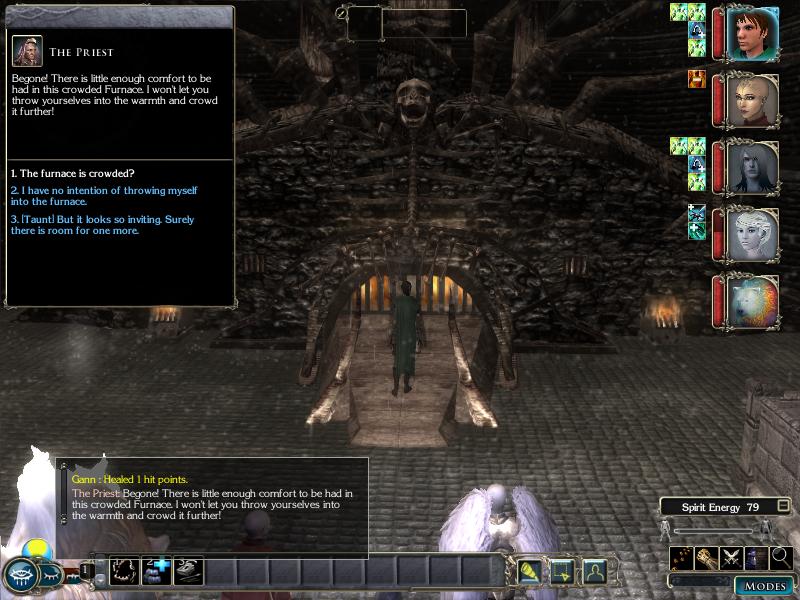
Once the undead are gone, we can approach this ghostly figure.
 : Crowded, yes. Beyond capacity! There is no room!
: Crowded, yes. Beyond capacity! There is no room! : Go now and find some other warmth!
: Go now and find some other warmth!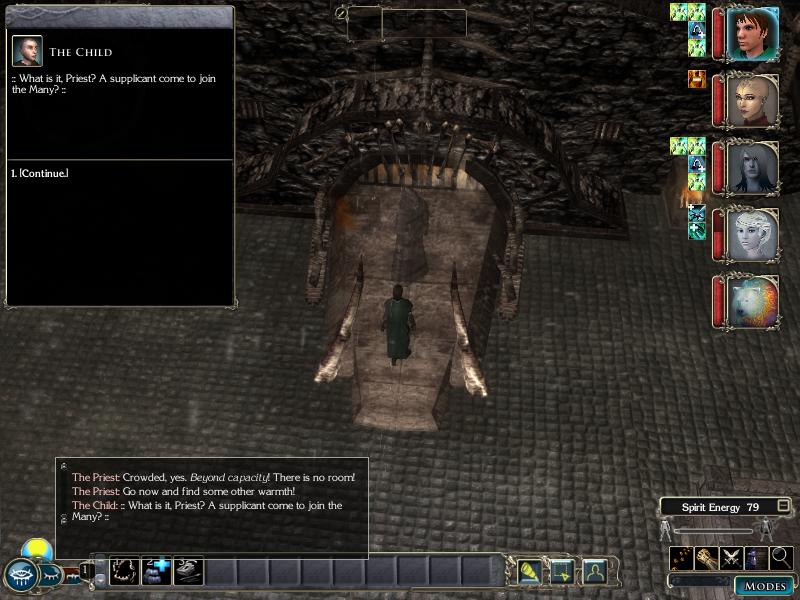
Suddenly another ghost appears. Ooh, spooky!
 : Nothing to concern yourself with, Child. Recede back into the warmth of the Furnace.
: Nothing to concern yourself with, Child. Recede back into the warmth of the Furnace. : :: But do you sense it? Unlike others that have come, this one is compatible with the Many. ::
: :: But do you sense it? Unlike others that have come, this one is compatible with the Many. :: : Do not even think that! It cannot see you or hear you. And if it could... such a one could dominate the Many and silence my voice! I would no longer be One.
: Do not even think that! It cannot see you or hear you. And if it could... such a one could dominate the Many and silence my voice! I would no longer be One. : :: Do not fool yourself, Priest. You are One only because I granted it to save you from the Many's wrath. Do you wish me to wake the Brute? ::
: :: Do not fool yourself, Priest. You are One only because I granted it to save you from the Many's wrath. Do you wish me to wake the Brute? ::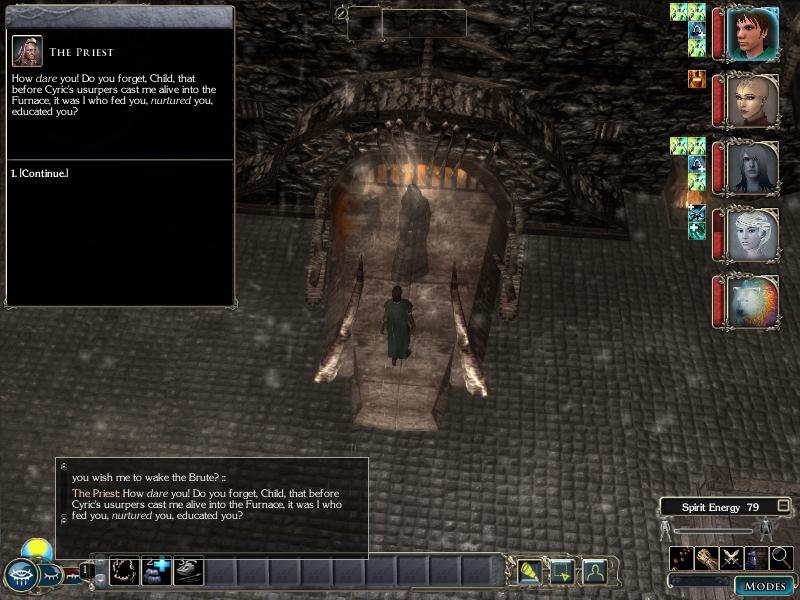
 : :: I've forgotten much, Priest. But that is one detail I can never forget, as you have recited it incessantly since you joined the Many and I regretfully made you One. ::
: :: I've forgotten much, Priest. But that is one detail I can never forget, as you have recited it incessantly since you joined the Many and I regretfully made you One. :: : You should be grateful that I kept the secret of your existence safe throughout the hours of torture I endured for being the High Priest of a slain god!
: You should be grateful that I kept the secret of your existence safe throughout the hours of torture I endured for being the High Priest of a slain god! : For if I had let that detail slip, you and the rest of the Many would have been exorcized from the comfort of the Furnace and sent to the City of Judgement to become mortar for the Wall of the Faithless!
: For if I had let that detail slip, you and the rest of the Many would have been exorcized from the comfort of the Furnace and sent to the City of Judgement to become mortar for the Wall of the Faithless! : Priest, who is the child you are speaking to?
: Priest, who is the child you are speaking to?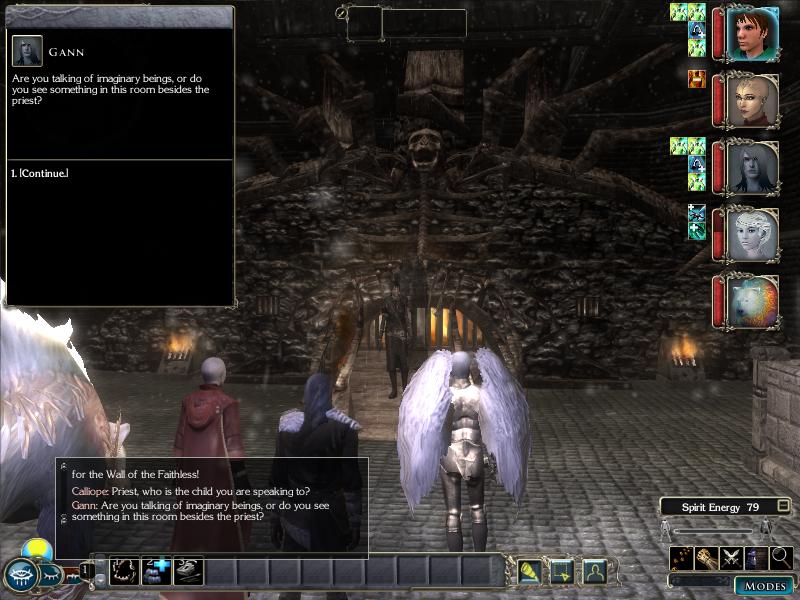
Um... I suppose this is a side-effect of our spirit-eater status.
 : :: Did you hear what it said? It can see and hear me! The Brute must witness this! I will go fetch him. ::
: :: Did you hear what it said? It can see and hear me! The Brute must witness this! I will go fetch him. :: : No, not the Brute. Not the Brute!
: No, not the Brute. Not the Brute!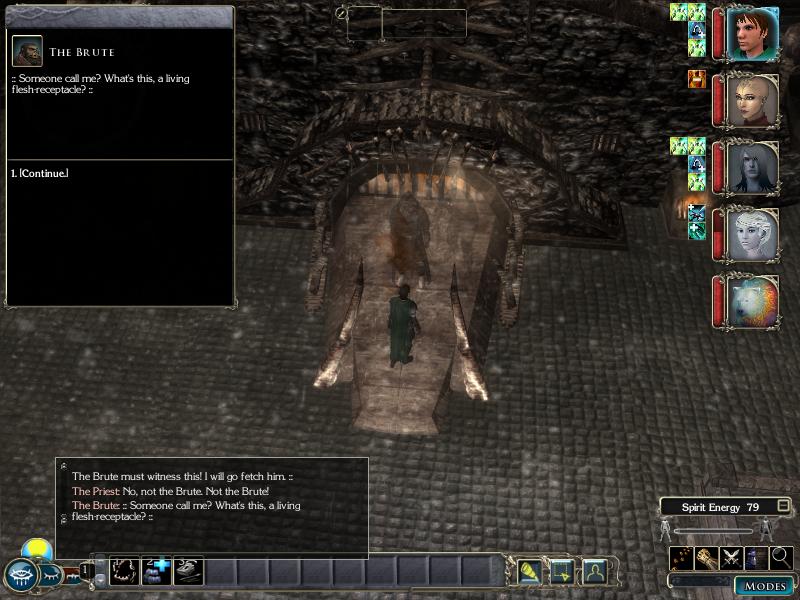
 : No, no, Brute! Go back into the Furnace. Yours is the last face I want to see, you mindless murderer!
: No, no, Brute! Go back into the Furnace. Yours is the last face I want to see, you mindless murderer! : :: You be silent, Priest! Or I'll leave here, find more of your still-living family to slay. ::
: :: You be silent, Priest! Or I'll leave here, find more of your still-living family to slay. :: : Leave? You can never leave! And even if you could, my progenitors are already dead, thanks to you, monster!
: Leave? You can never leave! And even if you could, my progenitors are already dead, thanks to you, monster! : Do you forget when I hunted you down for slaying my wife, my son? And then when I had you tossed, swearing, into the Furnace...
: Do you forget when I hunted you down for slaying my wife, my son? And then when I had you tossed, swearing, into the Furnace... : :: You, you be silent! ::
: :: You, you be silent! :: : ...and I spat on you while your flesh blistered, and watched the spittle boil and evaporate on your forehead as your final words went unheard over the roar of the inferno!
: ...and I spat on you while your flesh blistered, and watched the spittle boil and evaporate on your forehead as your final words went unheard over the roar of the inferno! : Obviously you two have a complicated past.
: Obviously you two have a complicated past.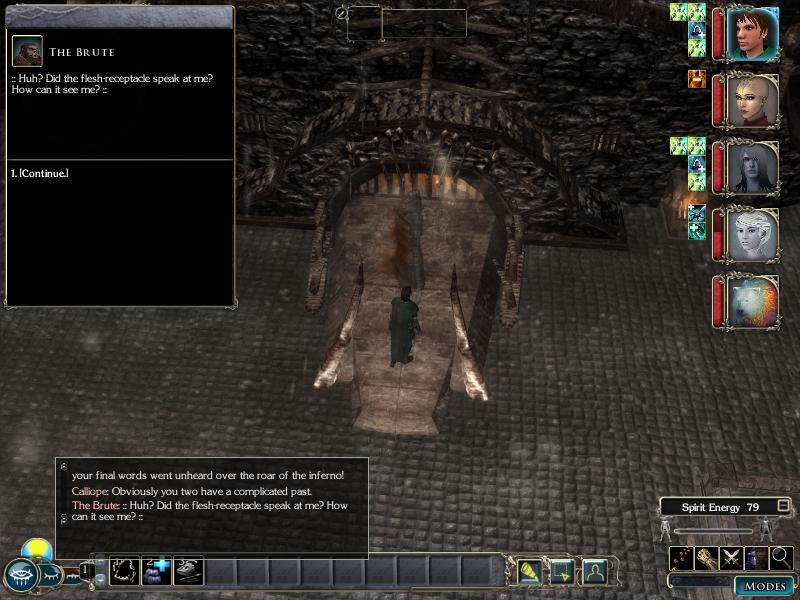
 : Yes, you low-born son of a corpulent pig! The Child called for you to witness this. Some other one can see you and hear you as I once did when I lived.
: Yes, you low-born son of a corpulent pig! The Child called for you to witness this. Some other one can see you and hear you as I once did when I lived.Well maybe it doesn't have anything to do with spirit-eating at all.
 : ::Well, you impotent worshipper of a dead god, let us grab it and take it into the Furnace, so that it might join the Many. ::
: ::Well, you impotent worshipper of a dead god, let us grab it and take it into the Furnace, so that it might join the Many. :: : No! I am One and I forbid it. Eventually this one will tire of being ignored and move on.
: No! I am One and I forbid it. Eventually this one will tire of being ignored and move on. : :: Feh! I was roused for nothing! It will take me some time to find a comfortable place among the crammed furnace. Do the Many a favor and be silent until then! ::
: :: Feh! I was roused for nothing! It will take me some time to find a comfortable place among the crammed furnace. Do the Many a favor and be silent until then! ::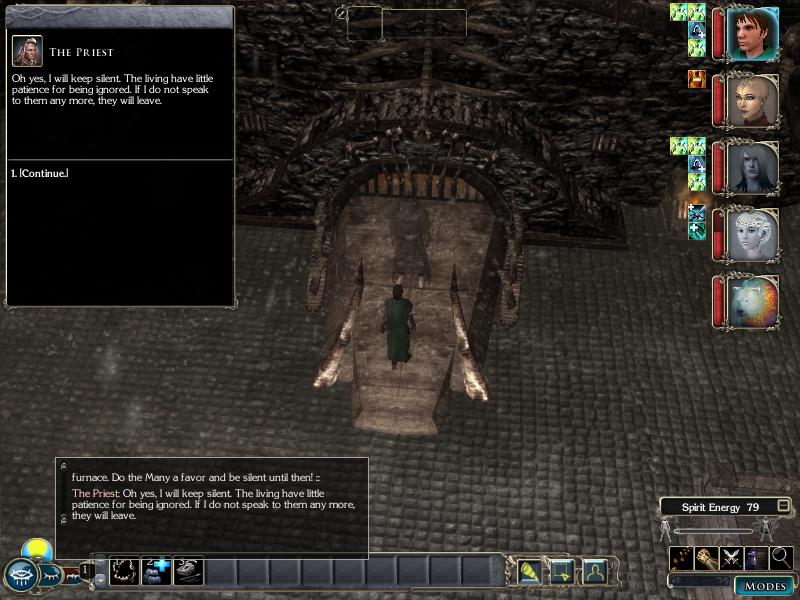
This is the block for Act 2. The Priest will ignore all attempts to interact with him once this line is given.
But with our new spirit-eater powers...
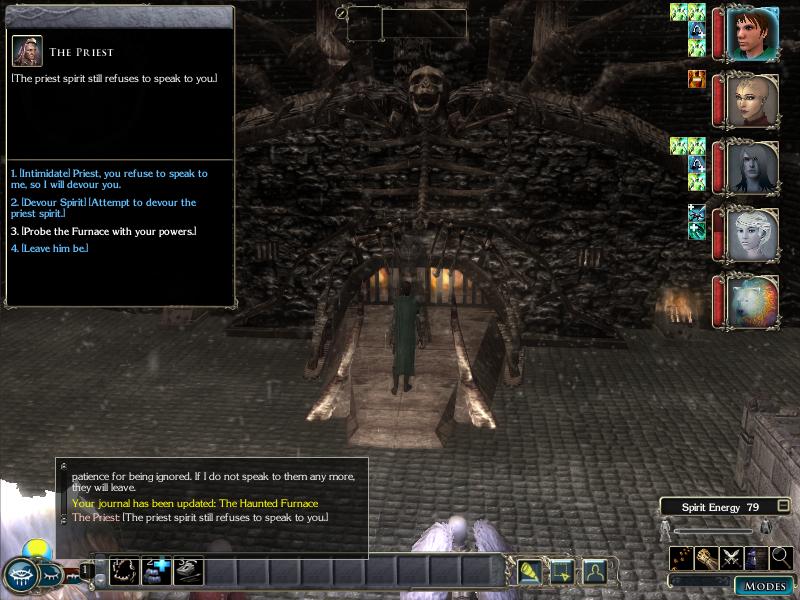
 : [You sense a great many spirits within the Furnace. Murderers, rapists, petty thieves and even some innocents, all cremated in the Furnace and cursed to remain bound to it.]
: [You sense a great many spirits within the Furnace. Murderers, rapists, petty thieves and even some innocents, all cremated in the Furnace and cursed to remain bound to it.] : Wait, what are you doing? I can feel the power you possess. What are you?
: Wait, what are you doing? I can feel the power you possess. What are you? : I am a spirit-eater.
: I am a spirit-eater. : A spirit-eater? I have a vague recollection... When I was still living, I was Myrkul's High Priest. The god always mistrusted me, because my predecessor Akachi...
: A spirit-eater? I have a vague recollection... When I was still living, I was Myrkul's High Priest. The god always mistrusted me, because my predecessor Akachi... : What did Akachi do?
: What did Akachi do? : He... betrayed Myrkul. And he was punished. I was chosen to replace him as High Priest because I was the most removed from his association.
: He... betrayed Myrkul. And he was punished. I was chosen to replace him as High Priest because I was the most removed from his association. : How was Akachi punished?
: How was Akachi punished?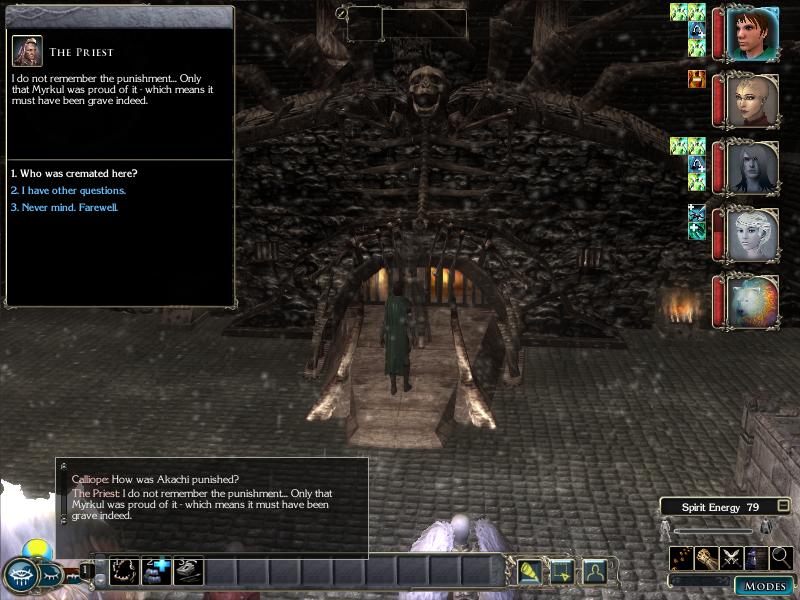
The Priest also explains the basic concept behind the Furnace.
The Furnace is currently home to the spirits of its countless victims, collectively called the Many. They hide within the Furnace for fear of what lies outside, be it the wrath of the gods or the cold silence of the Plane of Shadows. The three most powerful are the Priest (who is the One, the leader of the group), then the Child (stronger than the Priest, but unwilling to lead directly) and the Brute (a psycho half-orc). The Brute's crime was murdering the Priest's wife and children; meanwhile, the Child attacked and mutilated his parents, then burned down a temple of Myrkul, though the Priest believes the Child innocent for some reason.
The Priest, however, was murdered by followers of Cyric, the god who took over Myrkul's domain when Myrkul died. They tortured him in an attempt to discover the secrets of the Vault... when he remained silent, they threw him into the Furnace.
A tragic story. However, like Cyric's priests, we want in to the Lower Vault, and this Priest is standing in our way.
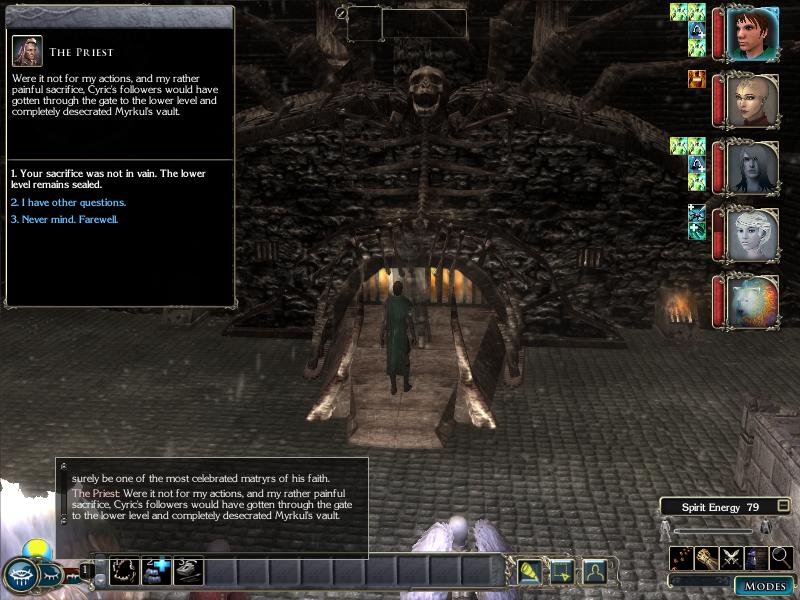
 : That is... good to hear. I have endured such torment, both prior to death and after.
: That is... good to hear. I have endured such torment, both prior to death and after. : Though I may never be released from this Furnace, I can endure it easier knowing my sacrifice meant something.
: Though I may never be released from this Furnace, I can endure it easier knowing my sacrifice meant something. : [Sympathizing with this tormented spirit has somewhat diminished your hunger, and the desire to devour him.]
: [Sympathizing with this tormented spirit has somewhat diminished your hunger, and the desire to devour him.]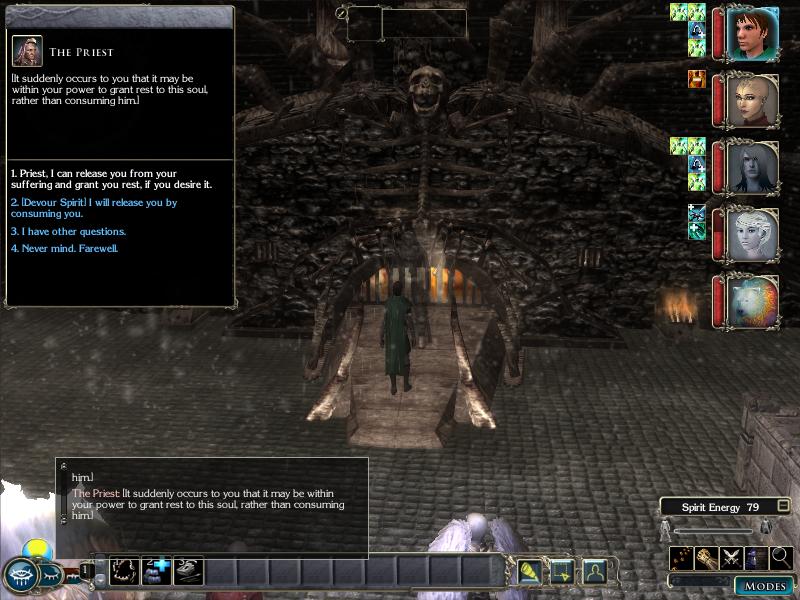
Okay, this is our first proper new spirit-eating power (Mold Spirit doesn't count because it's boring). It's also my first big cheat.
Evil characters don't get to sympathise with the Priest over his plight - his petulant whining just makes them hungrier. Only Good or Neutral characters can be nice to him.
 : Truly? Eternal rest seems an impossible dream for the damned servant of a dead god...
: Truly? Eternal rest seems an impossible dream for the damned servant of a dead god...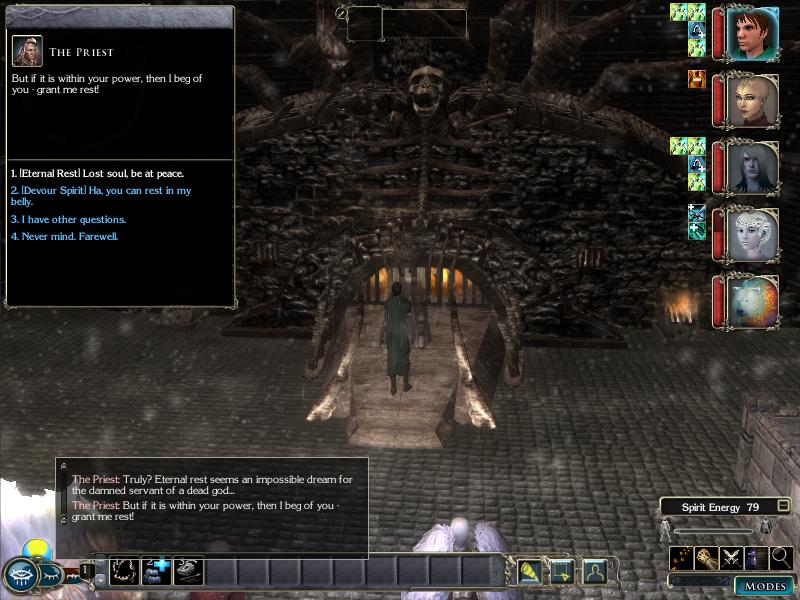
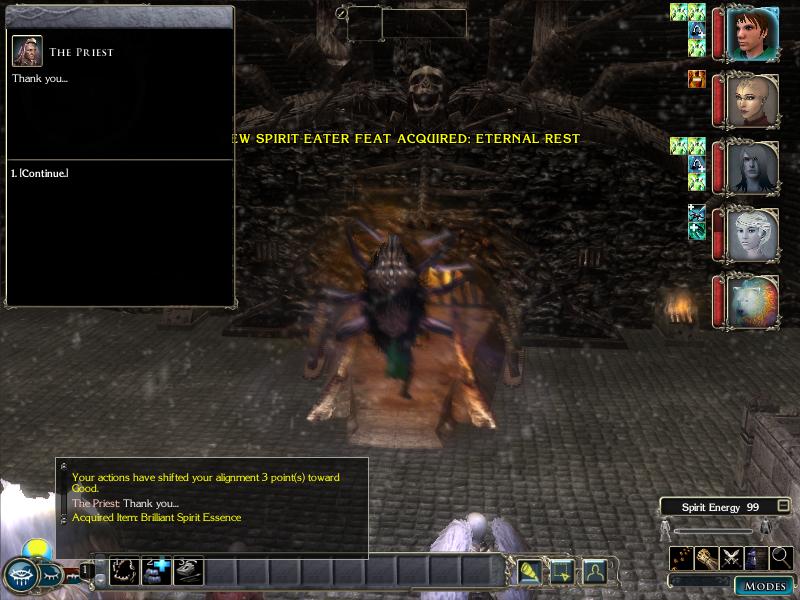
Eternal Rest is a Good version of Devour Spirit; instead of consuming the spirit, you can release its ties to this world and send it on to the next. Somehow this replenishes your Spirit Energy... less than you'd get from Devouring, but more than you'd receive from Suppression.
It uses the same mechanic as Devour Spirit (one quarter damage, get a Spirit Essence for landing the killing blow) and each use of Eternal Rest counts as a use of Devour Spirit, so you can't use it on the same day as Suppress. Unlike Devour Spirit it doesn't increase Craving (but it doesn't decrease it either) and it can only be used on undead spirits, not elementals or fey.
Eternal Rest is incredibly useful in the Plane of Shadows and the Death God's Vault, but nigh-useless anywhere else. However, careful management of the Vault means that you'll practically never have to Devour another spirit anywhere else ever again.
Unfortunately we have unfinished business with the Furnace. With the passing of the One, the Many are now appearing all around us...
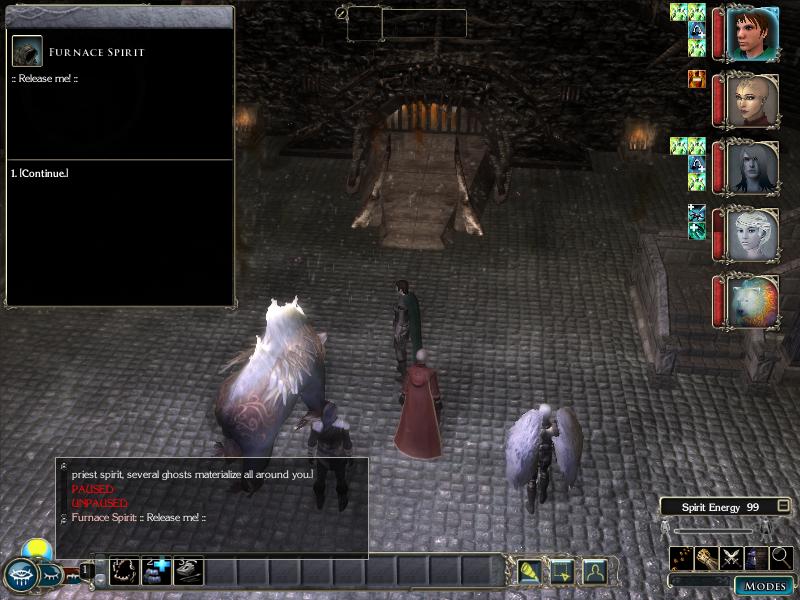
 : :: I suffer too! ::
: :: I suffer too! :: : :: Grant me rest! ::
: :: Grant me rest! :: : :: No, grant me rest! ::
: :: No, grant me rest! :: : :: Child, come now! The Many flocks to the flesh-receptacle who exorcised the Priest! ::
: :: Child, come now! The Many flocks to the flesh-receptacle who exorcised the Priest! :: : :: I am here, and I see. ::
: :: I am here, and I see. :: : :: We must slay it now before it disperses the Many. Before we meet the same fate as the Priest. ::
: :: We must slay it now before it disperses the Many. Before we meet the same fate as the Priest. ::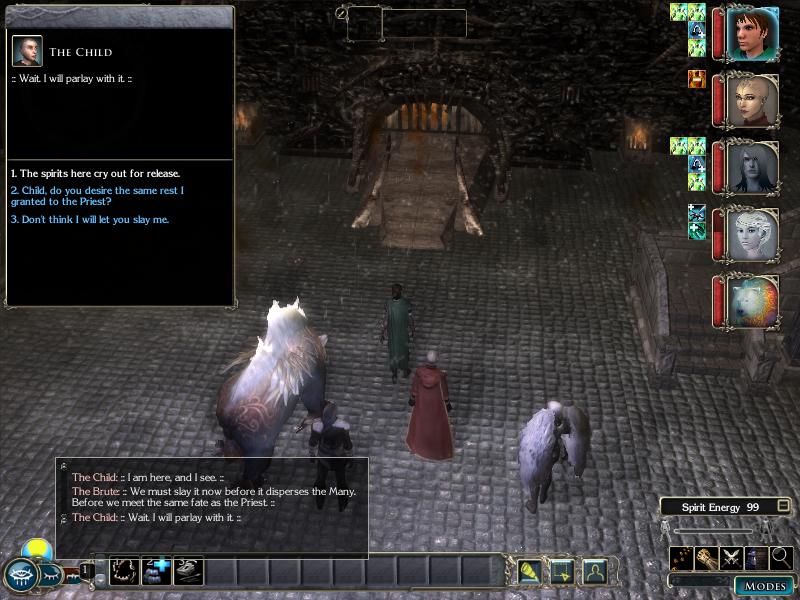
 : :: You have great power, and therefore command the respect of the Many. We can help each other. ::
: :: You have great power, and therefore command the respect of the Many. We can help each other. :: : :: You wish passage through the gate to the lower level of this vault. And we crave to be free of this Furnace we are bound to. ::
: :: You wish passage through the gate to the lower level of this vault. And we crave to be free of this Furnace we are bound to. :: : So you will give me the key to the gate if I release you?
: So you will give me the key to the gate if I release you? : :: The key to the Lower Vault is within this Furnace, hidden by the Priest long ago. However, it cannot be retrieved until the spirits that haunt it are freed. ::
: :: The key to the Lower Vault is within this Furnace, hidden by the Priest long ago. However, it cannot be retrieved until the spirits that haunt it are freed. :: : How can I free the spirits?
: How can I free the spirits? : :: The Many is complacent and comfortable. Though some wish release, others huddle within the Furnace, refusing to come out for any reason. ::
: :: The Many is complacent and comfortable. Though some wish release, others huddle within the Furnace, refusing to come out for any reason. ::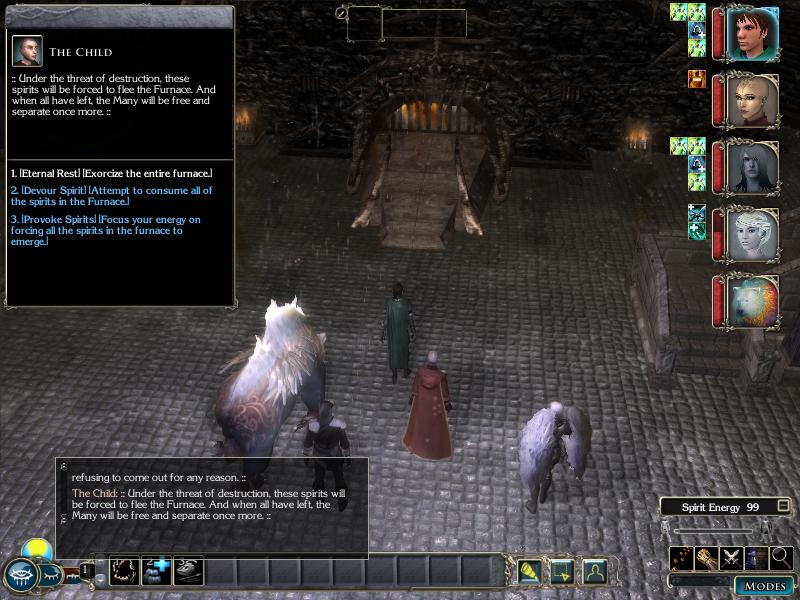
Hmm. Sounds untidy, and untidy = Chaotic.
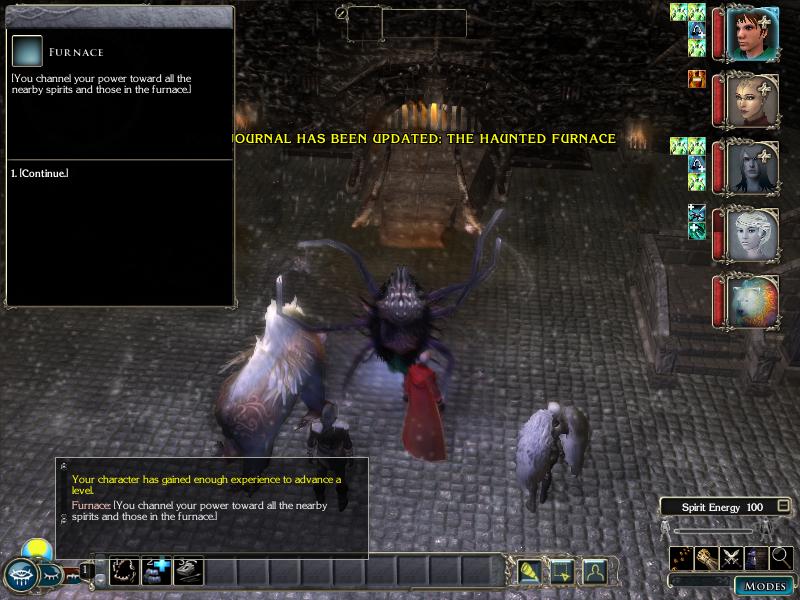
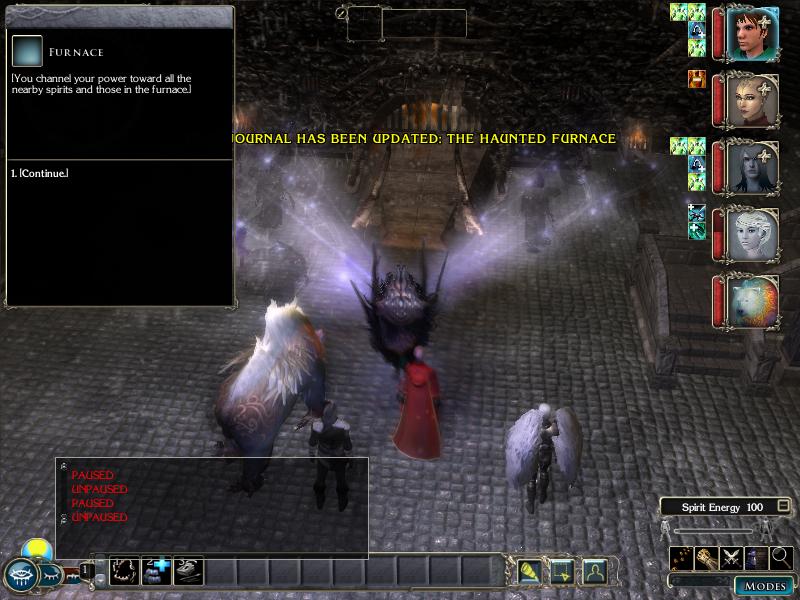
Ye-e-es.
 : :: You should not have done that. You destroyed the weaker spirits, but the stronger ones remain. And we will rebuild the Many, starting with you! ::
: :: You should not have done that. You destroyed the weaker spirits, but the stronger ones remain. And we will rebuild the Many, starting with you! ::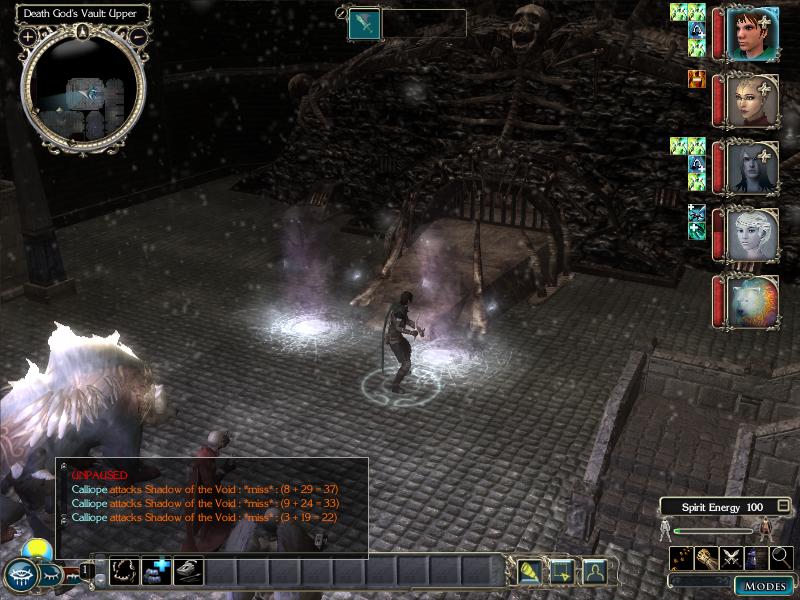
The Brute and the Child then transform into Shadows of the Void - cold-damage-dealing wraiths that are very strong and very tough. Again, a sudden spike in difficulty to keep us on our toes.
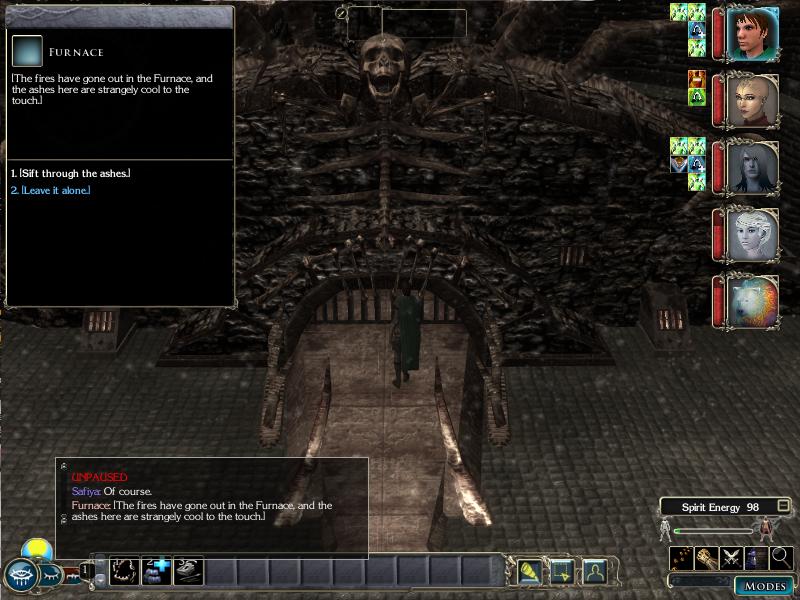
 : [You grope blindly through the thick soot, and finally grasp the handle of a weapon that feels hauntingly familiar.]
: [You grope blindly through the thick soot, and finally grasp the handle of a weapon that feels hauntingly familiar.]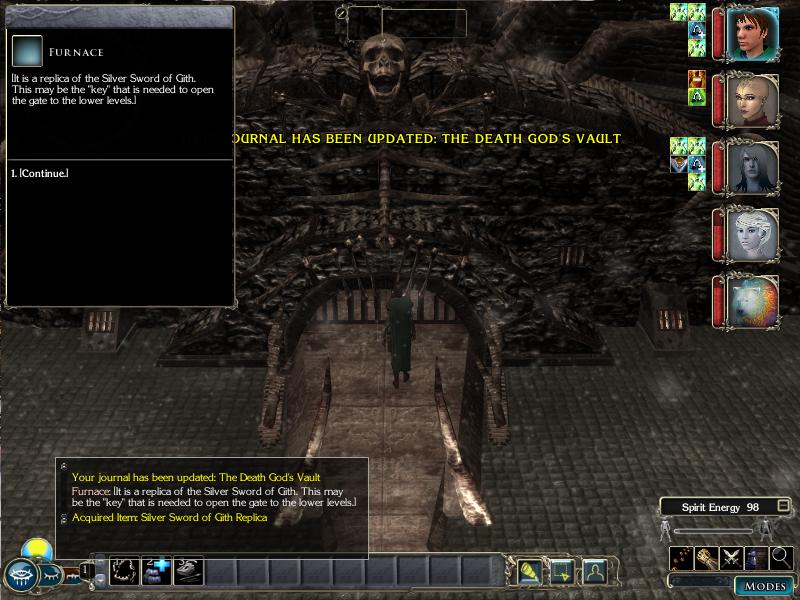
Jesus Christ, not this thing again.
Will no one rid me of this damnable sword?!
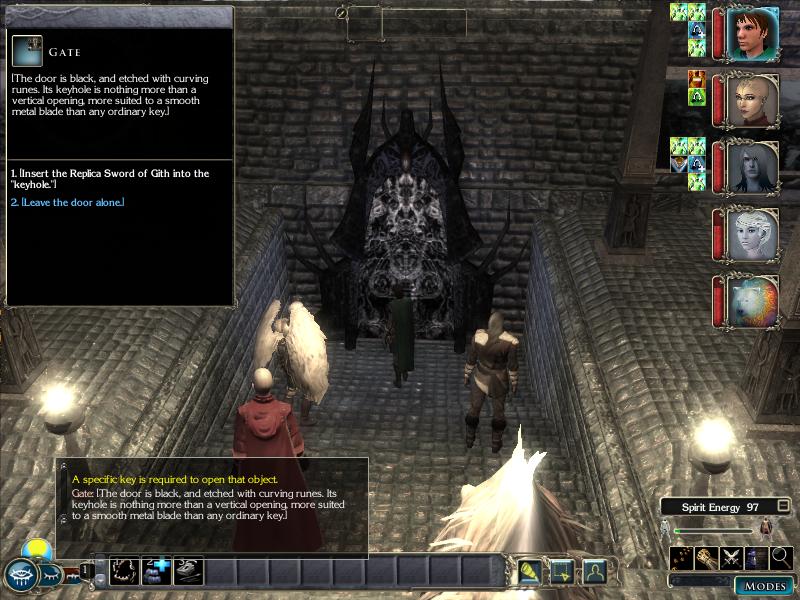
 : [The blade clicks into place, turns, and is suddenly drawn inward, vanishing into the shadowy substance of the door. The gate swings open...]
: [The blade clicks into place, turns, and is suddenly drawn inward, vanishing into the shadowy substance of the door. The gate swings open...]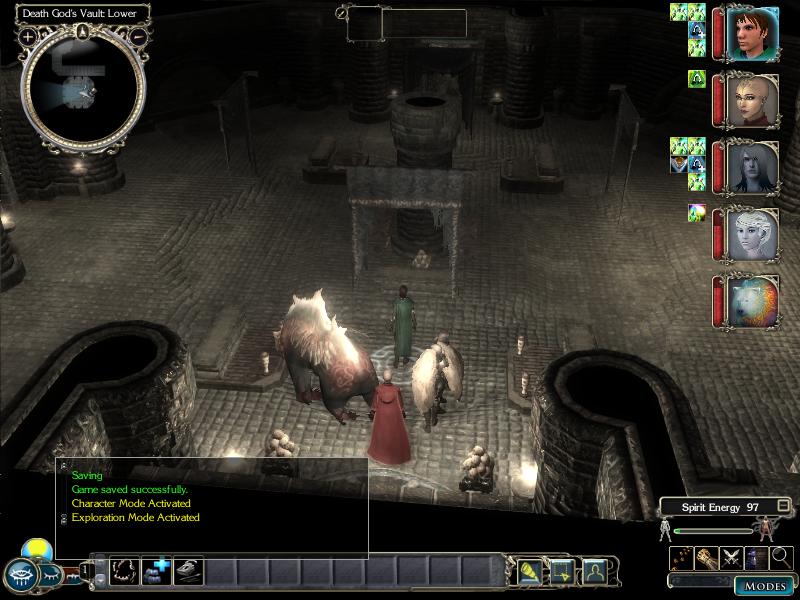
The Lower Vault. At last.
And this is where I shall leave you, in part because we've run out of time but also because:
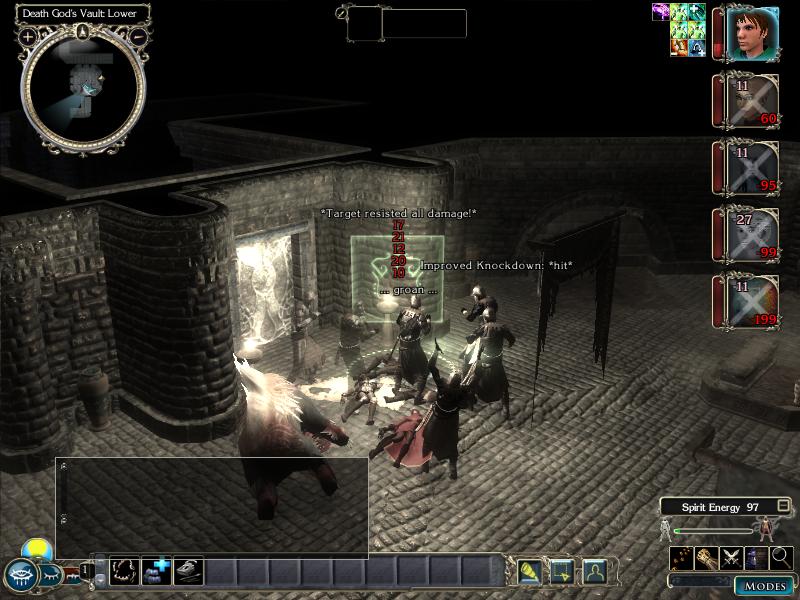
Remember what I said about Mask's intentionally-uneven balance? Party level is about 21; the Lower Vault is designed for characters of Level 27-29.
Which isn't to say we can't explore some of it. Good tactics and enough spells can give the canny player a fighting chance against the undead, and if the worst comes to the worst, Calliope can always sneak her way to the treasure. But in a world of ascended mortals and squabbling godlings, the recommendation of the module-maker is the closest thing we have to Divine Mandate. And Calliope is nothing if not Lawful.
For now.